Ranking the Biggest NFL Playoff Upsets
A ranking list of the 20 biggest playoff upsets of the NFL's Super Bowl era.
It’s playoff time everybody!
For me, this tends to be a heartbreaking experience, as one of my favourite sayings on this publication is that the playoffs are where good stories go to die, and I’ve never had the privilege of covering a player or team that’s won the Super Bowl on this publication yet, but for one group of fans each year, January and February bring the ultimate elation.
Only one team every year gets to call themselves champions. However, there is more than one way for a team to create playoff memories for their fans. Even more so than the crowning of a champion, one of the most entertaining things about any playoff format is a good old-fashioned upset, and that’s what I’ve decided to look at today. I’m going to rank the NFL’s 20 biggest playoff upsets in the Super Bowl era (1966-present).
I pay no consideration to seeding in the tournament in this list. For a game to qualify as an upset for consideration, one of two things has to happen. Either a team with fewer wins had to have beaten a team with more, or if the teams had equal wins, I counted it as an upset if the road team won. For example, 11 win Kansas City beating 11 win Buffalo on the road last year counts as an upset for the purposes of this list. However, 12 win San Francisco defeating 12 win Detroit at home last season does not count.
There are potential circumstances where an upset can happen that fall outside of these parameters, but no instance where a game would make the top 20, so I deemed it minor enough to ignore.
This whittling leaves me with a sample of 183 playoff games in the last 58 seasons of NFL football to look through that match the criteria. To put these games in order, I devised a mathematical formula comprising of eight variables to give each game an upset score, in the following order of importance:
Difference in wins between the two teams. Regular season win total has never been a very important variable, but when quantifying the level of an upset, it does have to come into the equation, even if at the lowest possible impact level.
Are the two teams division rivals? This is simple enough to understand. It’s easier to upset divisional opponents than it is to upset teams that are not in your division. Playoff upsets within the division all incur a slight penalty
Difference in quality between the two teams’ best (non-QB) player. For simplicity, I measured this difference in terms of football reference’s AV statistic. This factor doesn’t come up very often, but occasionally there is a non-QB game wrecker that can take a poor team pretty far. For instance, the 2009 Jets having by far the best player in football in Darrelle Revis keeps them off this top 20 list.
Difference in quality between the two teams’ QBs. Those who know me know I’ve made a QB tier list for every NFL season going all the way back to 1966. I will measure the difference between the two QBs by how many places apart they are on those tier lists. This also is a factor that doesn’t have as much individual importance as you’d think it would, as it’s often subsumed into the following four, which is why it’s only fifth most important.
Did the road team win? Due to how NFL playoff seeding works, vastly inferior teams can still be the home team occasionally. Upsets where the winning team is at home incur a rather harsh penalty. Note that this dummy variable is always coded as zero in the Super Bowl, a game where there is no home or road team, putting that particular playoff round (rightfully in my opinion, and intentional by formulation) at a distinct disadvantage on this list.
Difference in point differential between the two teams. Point differential is the closest thing one can get to an objective measure of the quality of a team, and if one team is dramatically better in terms of point differential than another, that means it is almost certainly a dramatically better team.
Difference in football reference’s SRS between the two teams. Football reference markets this difference as a measure of what the point spread ought to be when two teams play each other. I am a bit weary of this interpretation, but for an exercise like this, I am willing to take them at their word, and accept this as a measure of an optimal point spread, if the public had perfect information.
Point spread at kickoff. Point spreads are not objective folks. They shift based on what the public thinks about what’s happening. This makes the point spread a perfect measure of how big the public thinks an upset is, even if an upset is not necessarily that big in reality.
I think when ranking upsets that vibes are the most important thing to capture, which is why I’ve incorporated point spread (the closest thing to a measure of the vibe I can get) as the heaviest weighted factor. Just because vibes are the most important factor doesn’t mean they can’t be overruled though. This list starts at number 20 with a powerful instance of the feel of a big upset being overpowered by the fact that the two teams were not as far apart as the fans thought they were, but before I get there, let’s get to some honourable mentions.
Honourable Mentions
1969 Super Bowl - 11-3 Kansas City Chiefs def. 12-2 Minnesota Vikings
This game had massive upset vibe, with the general public not believing in the AFL at the time. This game’s point spread of 12 points in favour of the Vikings at kickoff is the largest any game has seen overcome, but fail to be a top 20 upset of all time. The reason is simple. Upset vibe cannot be everything.
The difference in point differential between these two teams is not super wide. It’s only 64, and this game is where the QB factor really comes into play, as despite being the leader of one of the best teams of all time in the 1969 Vikings, Joe Kapp cannot match Len Dawson, and no matter how much hate the AFL got at the time, a 12 point spread cannot climb that mountain.
1979 NFC Divisional - 9-7 Los Angeles Rams def. 11-5 Dallas Cowboys
A counterpoint to the game above. Those who think the QB position is everything ought to watch this one back, as this 1979 game is one of the largest QB spreads ever played in a playoff game in general, and by far the biggest one ever overcome, as second ranked in 1979 Roger Staubach takes on 31st place Vince Ferragamo, and unbelievably loses 21-19.
The only reason this game didn’t make the list is that the 1979 Cowboys were no great team, with a point differential of just 58 and an SRS score of just 3.3 points. The 1979 NFC is one of the weakest conferences of all time, and this upset is just the crown of thorns on top of it.
2023 AFC Conference Championship - 11-6 Kansas City Chiefs def. 13-4 Baltimore Ravens
This game’s SRS difference (which we’re interpreting as a perfectly optimal point spread) of 9.42 in favour of the loser is the largest in the last 58 years of NFL football that fails to make the top 20 upsets of all time. The difference in point differential of 126 is also wider than some games that are in the top 20, but the Chiefs have three different saving graces here.
The first is that they had by far the best non-QB on the field in Chris Jones. Slightly more importantly, Patrick Mahomes and Lamar Jackson were only one spot apart on the 2023 tier list, meaning the QB factor contributed nothing to this game’s score, but the main reason this game fails the test is that it had absolutely no upset vibe, with a point spread at kickoff of just four points in favour of Baltimore.
That Kansas City aura means something. It’s the only thing that kept this game out of the top 20 upsets of all time.
There are other honourable mentions too (like Vince Ferragamo getting the Cowboys again in 1983, which also falls just short of the top 20), but I chose those ones to showcase the interactions between the eight unique variables in this equation I’ve created, and to perhaps blunt the reaction that comes with the game I’m about to rank 20th.
Biggest Upsets in NFL History
20) 1998 NFC Conference Championship - 14-2 Atlanta Falcons def. 15-1 Minnesota Vikings
Point Spread: 11
SRS Difference: 4.91
Point Differential Difference: 107
Road Winner? Yes. Division Rivals? No
QB Difference: 5 (Randall Cunningham vs Chris Chandler)
Best Player: LG Randall McDaniel (18 AV) vs. RB Jamal Anderson (19 AV)
Yup. The juiciest ranking on the whole list is the one that starts it off. I have this game 20th.
This game is why this list had to be 20 spots big. If this game had landed 21st the list would’ve been 21 games big. There’s no upset ranking that can be made that doesn’t discuss this game, because look at that upset vibe. An 11 point spread is wide. Very wide. Games don’t cross the ten point threshold very often, even in this top 20, especially in the bottom half of it. I’ve ran into people in football discourse who think this game is the biggest upset of all time.
However, just like I said above with the 1969 Super Bowl (funnily enough, also involving a Vikings loss), upset vibe cannot be everything. The public in 1998 thought of the Atlanta Falcons like they were the 2022 Minnesota Vikings. A lot of wins yes, but nothing behind them. A total fluke, and the collapse of the Falcons in the years immediately after this game, in the eyes of some, bears that out, but I disagree.
The 1998 Falcons were not as bad as everybody thought they were. Their point differential for the season was positive 153. That’s more indicative of a 12 win team than a 14 win team, but nowhere near a fluke. This is a team that could’ve been betting favourites to win the NFC in a different season, if not forced to share a conference with the all-time greatness of the 1998 Minnesota Vikings.
Adding some fuel to the feeling that they had no chance is that the Atlanta Falcons had just had to play a knock down, drag out playoff game against a top five team in the NFL (SF 49ers) in round two to get here, whereas the Minnesota Vikings got a total cupcake in the 1998 Arizona Cardinals, who (spoiler alert) played a game that’s going to be featured higher on this list just to make it to that point.
The Vikings were well rested. The Falcons were not, and Atlanta came out dead in the first half. This game looked over with Minnesota holding the ball with a 20-7 lead, looking to score even more points in the two minute drill at the end of the first half. However, destiny turned when Randall Cunningham fumbled the football, and instead of potentially 27-7 at the half, it was 20-14.
This allowed the game to stay close enough to the point where one possession game luck (in this case, Gary Anderson missing his first field goal in two years) could intervene and decide the Falcons were going to win this football game. There would be no playoff run for the all-time great 1998 Minnesota Vikings.
Have no doubts that the Vikings were the better team, even in this game. 6.25 total EPA to Atlanta’s 3.76 means by all rights the Vikings should have won, but Atlanta was a good enough team to stay within one score of the Vikings for the whole game, and this allowed some luck to go their way in the fourth quarter, and they snuck out of Minnesota with a very undeserved win.
Still, despite the immense upset vibe, the difference in the quality of these two teams is not enough to warrant any higher spot than 20th on this list.
19) 1983 AFC Divisional - 9-7 Seattle Seahawks def. 12-4 Miami Dolphins
Point Spread: 8
SRS Difference: 6.25
Point Differential Difference: 133
Road Winner? Yes. Division Rivals? No
QB Difference: 5 (Dan Marino vs Dave Krieg)
Best Player: DE Doug Betters (20 AV) vs. RB Curt Warner (15 AV)
Note the year on this.
This is 1983 we’re talking about. 1983 was Dan Marino’s rookie season, which explains how a Miami Dolphin team with the best defence in the NFL and Dan Marino can be just 6.25 SRS points better than the 9-7 Seattle Seahawks (who were in the AFC back then). It also explains how Dan can be just five spots better in my 1983 tier list than Dave Krieg. Both of these factors hold this game down a lot, but with a point spread of eight points coming into the game, there was pretty major upset vibe, which helps to lift this game all the way back up to 19th.
Coming into the first playoff game of Dan Marino’s career, he had only lost twice after taking over a 3-2 Miami Dolphins team, leading them to a strong 9-2 record in averaging 28 points for the remainder of the season, which for 1983 was extremely impressive. Contrast this against the Seattle Seahawks, who had spent the whole season trading wins and losses, having reached at different points in the season 2-2, 3-3, 4-4, 6-6, and 7-7 records.
There were some impressive wins in there, including a fantastic showing on the road against the 1983 Super Bowl champion Los Angeles Raiders 34-21, and they did clutch up in winning their last two games of the season, including a win-and-in week 17 game against the New England Patriots team not far away from winning the AFC themselves in 1985, but still. There was nothing about these wishy washy Seahawks that convinced anybody they could beat the mighty Miami Dolphins, even if they had a rookie QB at the helm.
That’s why they play the games.
As will become common throughout this list, these teams fight to a dead draw on the field, with 334 yards of total offence for Seattle, compared to 321 for Miami, and an identical 21 first downs each. This is exactly what the Seahawks need, as it allows one possession game luck to swing their way and decide this game, as the Dolphins fumble the ball three times (twice on special teams), all of which are recovered by Seattle. These turnovers keep the ball out of the hands of the electric Miami offence just enough for the Seahawks to get out of Dodge with a 27-20 road win.
We see what happens when this Seattle defence isn’t bailed out by turnovers in the AFC Championship game, when they quickly fall behind 20-0 in a game that’s finished before the second quarter even ends. This begins a trend for the Seahawks, as in the wake of this incredible upset they will win just one playoff game for the next 22 years.
That’s the price you have to pay for the 19th biggest upset in NFL history.
18) 2017 AFC Wild Card - 9-7 Tennessee Titans def. 10-6 Kansas City Chiefs
Point Spread: 8.5
SRS Difference: 6.92
Point Differential Difference: 98
Road Winner? Yes. Division Rivals? No
QB Difference: 11 (Alex Smith vs Marcus Mariota)
Best Player: RB Kareem Hunt (15 AV) vs. FS Kevin Byard (14 AV)
I bet you didn’t remember this one, but it’s important in retrospect. This is the game that convinced the KC Chiefs that Alex Smith couldn’t cut it.
2017 was the first season of the Kansas City Chiefs that we would come to know from 2017-2021. Tyreek Hill. Travis Kelce. Kareem Hunt. Chris Jones. You name it. Whoever needed to be there was there, and with circumstances this good, even Alex Smith could shine. With his 2017 stats of 0.177 EPA/Play (9th) on a 5 flat CPOE (3rd), Alex Smith ranks third on my 2017 tier list, which explains the rather wide-feeling 11 spot gap between himself and his counterpart in Marcus Mariota.
These two teams were not that far apart. The difference in point differential of just 98 is the only two digit number you will see on this whole list. Much like the Minnesota and Atlanta game from earlier, this game is carried to this position on the back of the massive 8.5 point spread, mostly based on the perception that the Tennessee Titans were a total fluke.
Unlike the 1998 Falcons, these Titans were a fluke, with their seasonal results being wholly reliant on a mid-season stretch from weeks six to 13 in which Tennessee won six of their seven games. Most of these six wins are one possession games against awful teams, including a 12-9 OT win over the 0-16 Cleveland Browns. Outside of this stretch, this was a 3-6 football team, who won their way into the playoffs in the final week of the season against a Jacksonville Jaguar team who were resting starters. Nothing gave any indication they could stand up to any real opponent, let alone the burgeoning dynasty (albeit one that was still a few years and a QB change away) in Kansas City.
In another close parallel to the Minnesota-Atlanta game, the Titans come out completely dead in the first half, falling behind 14-0 and then 21-3. In this case, destiny changes when Harrison Butker misses a FG that could’ve given the Chiefs three more points, which they desperately needed. The whole team falls to bits after that. They get only three more offensive possessions, as the Titans kill the clock in scoring two Derrick Henry style touchdowns in a row, and when a fumble return for a touchdown is overturned by replay review the shock sets in. The Chiefs have fallen apart again. They’ve actually lost.
The final score is 22-21, and we can all think about what may have happened had Harrison just made that FG. The Chiefs may have put up more fight against the Patriots than the Titans did (35-10 loss), but they may not have. Who knows, but what we do know is that the second half of this game ended Alex Smith’s KC Chiefs career. He was radioactive after this performance, and truly never was the same afterwards.
Not the biggest gulf in quality of the teams in the world, but given where both these teams were going, this is a bigger upset in retrospect than it was at the time.
17) 2023 NFC Wild Card - 9-8 Green Bay Packers def. 12-5 Dallas Cowboys
Point Spread: 7
SRS Difference: 8
Point Differential Difference: 161
Road Winner? Yes. Division Rivals? No
QB Difference: 7 (Dak Prescott vs Jordan Love)
Best Player: WR CeeDee Lamb (20 AV) vs. CB Keisean Nixon (11 AV)
Contrary to the belief of those who think the Cowboys do this all the time, this is one of only two times they will show up on this list.
I wrote an entire article on this game when it happened, so I’m not going to go into too much depth here, but for the purposes of this list there are two weird things about it. The first is that there was (relatively) very little upset vibe. Given the SRS difference of eight points and the point differential disparity of 161, you would think the spread would be wider, but it wasn’t. This is largely because of LOL Dallas, but since we’re being objective here, and are immune to things like LOL Dallas, this is one of the bigger upsets in the history of the league.
The Cowboys were an elite team last season, likely the third best team in the NFL behind only SF and Baltimore. The Green Bay Packers were a team that got on a late season hot streak, and needed a lot of help to even get into the playoff field. There was nothing that said these two teams should’ve even been competitive with one another, and in technical terms they weren’t.
The Packers blew out the Cowboys 48-32 behind what (in my opinion) is the best playoff game any QB has ever played, with an unbeatable 1.13 EPA/Play out of Jordan Love, compared to a merely good game out of the Cowboy offence.
Let’s not give in to the LOL Dallas stuff. This was a shocking turn of events. Shocking enough to make it the 17th biggest upset in NFL history.
16) 1979 AFC Divisional - 11-5 Houston Oilers def. 12-4 San Diego Chargers
Point Spread: 8
SRS Difference: 7.42
Point Differential Difference: 134
Road Winner? Yes. Division Rivals? No
QB Difference: 23 (Dan Fouts vs Gifford Neilson)
Best Player: WR John Jefferson (12 AV) vs. RB Earl Campbell (15 AV)
Have you ever found yourself wondering where the Chargers’ reputation for playoff choking began? Look no further than this 1979 playoff game against the absurdly depleted Houston Oilers.
This was the toughest game to rank on this whole list, as it all comes down to Houston injuries in the prior week’s wild card playoff game against Denver. First was an injury to starting QB Dan Pastorini, meaning for this playoff game they were left with the second career start of QB Gifford Neilson to go against Dan Fouts, who had just had the first of what will go on to be four seasons in a row from 1979-1982 of being the best QB in the NFL.
The 1979 Houston Oilers were no bad team at all. They don’t deserve to be on this list as achieving one of the bigger upsets in NFL history. However, their game against Denver had brought down more than just Pastorini. What makes this game so hard to rank is that the Oilers also had to go without league MVP Earl Campbell, and leading WR Ken Burrough. Injuries had stacked the deck against the 1979 Oilers worse than any other team in football history. However, they still had the offensive line that’d made a RB the league MVP, which made this game somewhat difficult to call at the time.
In the annals of NFL history, there is no team quite like the 1979 San Diego Chargers. To say they zigged when everybody zagged would be an understatement. In a league where there were still more rush plays than passes overall, the Air Coryell Chargers finished dead last in rush plays called on offence, and forced other teams into calling the fewest rushes in the league against their defence.
If they could do that to the Oilers, they would win, and win easily, as there’s no way (contemporaneously or in retrospect) that Gifford Neilson could keep up in a passing contest against Dan Fouts, but if they couldn’t force Houston to throw the ball, nobody really knew what the Charger rush defence could do. It hadn’t been tested that much.
As it turns out, the rush defence was fine, but what nobody could’ve expected was the turnover luck that was about to hit the Chargers in the face. The Chargers outgained Houston 380 to 259, achieved 25 first downs to Houston’s 15, and definitively proved they were the better team than Houston, yet lost, due to a blocked field goal and five INTs, four of them to Vernon Perry, whose four INTs in this game will forever remain the NFL’s playoff record.
I also have to give some credit to Houston coach Bum Phillips, who went for it on fourth and goal at the one yard line (something almost never done in the 70s) with seconds remaining in the second quarter, realising his team needed to take every chance it could to get out with a win. They converted that chance, going into the half with a 10-7 lead instead of a 7-6 deficit, and in retrospect it is that decision that allowed the Oilers to win this game 17-14.
We see what this game could’ve been without the turnover luck next week in the AFC Championship, as the Oilers score six offensive points against the Steel Curtain and take one of the more lopsided losses in Conference Championship game history. However, nothing can take away that this is one of the gutsiest performances in NFL history. The Oilers deserve all the credit in the world for what they did on this day in 1979.
15) 2012 AFC Divisional - 10-6 Baltimore Ravens def. 13-3 Denver Broncos
Point Spread: 9
SRS Difference: 7.19
Point Differential Difference: 138
Road Winner? Yes. Division Rivals? No
QB Difference: 15 (Peyton Manning vs Joe Flacco)
Best Player: LB Von Miller (18 AV) vs. DE Haloti Ngata (13 AV)
Oh great. I have to talk about the 2012 Baltimore Ravens.
The team with the defence that was overrated, the offence that was overrated, and the supposedly elite QB (does anybody else remember the ‘elite’ Joe Flacco memes?) who finished 16th on my 2012 tier list. They were not the best team in their own division (Cincinnati Bengals). They lost every important regular season game they played (most notably, a 43-13 and 34-17 losses against the conference’s two top dogs in Houston and Denver). They only made it this far due to a cupcake first round matchup against the very bad 2012 Indianapolis Colts, and now they have to play the Broncos again.
The upset vibes are off the charts in this one. A nine point spread is extremely wide for a second round playoff game, and why wouldn’t it be that wide? This is a Denver team whose only three losses had been to the three best teams in the league, excluding themselves (13-3 Atlanta, 12-4 Houston, 12-4 New England). They may have problems with beating the top teams, but they don’t lose to middling teams like Baltimore. They come equipped with the league’s best offence to go against a Raven defence that can be described as merely above average, if I’m being charitable.
There is no reason that this game should even have been competitive, but some things just can’t be predicted. The two teams go back and forth for almost this entire game. In the first half, that means both teams score at will. In the second, that means neither team can score. Once again, the common formula in almost every upset, a great team is allowing a mediocre team to be competitive.
At this point, everybody knows that destiny turns on a miracle 70 yard touchdown pass with 40 seconds to go which takes Baltimore from a 97% chance to lose to a 35-35 tie. Everybody knows that Denver chickens out, doesn’t try to go kick the game winning FG with 30 seconds, two timeouts, and Peyton Manning on their team, and instead play for OT. Everybody knows that the Broncos punt on fourth and one in that OT, and that the Ravens kick a FG to win 38-35.
This game is very much an example of a great team getting caught playing not to lose, instead of reaching out and even trying to snatch a win. The Broncos got burned badly for it, lost their best chance to win a pre-2015 Peyton Manning Super Bowl, and became victims to the 15th biggest upset in NFL history.
This game is the story of the 2012 Broncos blowing it for themselves, but keep the 2012 Ravens on your mind. We’ll be seeing them again.
14) 1987 NFC Wild Card - 8-7 Minnesota Vikings def. 12-3 New Orleans Saints
Point Spread: 6.5
SRS Difference: 12.68
Point Differential Difference: 138
Road Winner? Yes. Division Rivals? No
QB Difference: 11 (Bobby Hebert vs Wade Wilson)
Best Player: CB Dave Waymer (14 AV) vs. LT Gary Zimmerman (12 AV)
Not the 1987 Vikings upset. That one is much higher on the list. This is the game that qualified them for that game, and because of what happens the next week in 1987, this game has been totally forgotten, unjustly in my opinion.
What an odd combination of statistics. This is the widest spread we’ve seen between two teams so far in terms of SRS, and in terms of point differential it’s second, despite the 1987 season being just 15 games long due to a players’ strike, but contrary to all that, the point spread of just 6.5 is the smallest we will see on this entire list. There is very little upset vibe here.
The story is just as odd as the stats. The 1987 Vikings remind me a lot of the 2017 Titans we discussed above. They had one midseason stretch winning five of six, and were 3-6 in their other nine games. This includes losing three of their final four to barely limp into the playoffs as the NFC’s fifth and final team, due to an extraordinarily weak conference that featured just five winning teams.
The Vikings (despite their winning record) were not a real team either, with their point differential of one point and their SRS of -2.6 making them probably the worst team that’d ever made the playoffs as of 1987, and they ran into an unfair matchup in the wild card round.
The New Orleans Saints had been in the NFL for 21 years, and had never had a winning season. That all changed in 1987. After starting the season 3-3 and looking like the same old Saints, this team ripped off nine in a row (including a win over the SF 49ers, always meaningful in the 80s) to finish the 15 game season with a 12-3 record, with that San Francisco game being the only one possession game in the whole nine game streak. It was extremely impressive.
However, since the Niners and Saints shared a division back then, their 12-3 record, despite being the second best in the NFL (behind only the 13-2 49ers), was not good enough to get them out of the wild card round.
The Saints’ history of futility is why they came in with a point spread of just 6.5, despite the gargantuan disparity in terms of team quality between themselves and the Vikings. This game should’ve been no issue for them, but then one of the weirdest things in NFL history happened.
The Vikings win this game 44-10, easily brushing to the side what (in my opinion) is one of the best teams of the entire 1980s decade in the 1987 New Orleans Saints. The Viking defence who’d been okay at best all season all of a sudden holds Bobby Hebert (the 7th best QB in 1987) to a passer rating of 37.9 in a game that’s never competitive.
I’d understand if the Vikings were able to fight to a draw with this Saints team, allowing one possession game luck to crown them the winners. We’ve seen that story several times on this list already. That story makes sense. I’ve never seen a football game make less sense in my life than this one.
The not-worth-mentioning 1987 Minnesota Viking defence walked out onto the field that day and had a playoff performance for the ages, against a team that should’ve been far too good to have that done to them. It’s not the last time they’d do this either. For the next playoff round in 1987, they’re shooting even higher.
Stay tuned. We’ll come back to the 1987 Vikings.
13) 1998 NFC Wild Card - 9-7 Arizona Cardinals def. 10-6 Dallas Cowboys
Point Spread: 7
SRS Difference: 10.86
Point Differential Difference: 159
Road Winner? Yes. Division Rivals? Yes
QB Difference: 4 (Troy Aikman vs Jake Plummer)
Best Player: CB Deion Sanders (18 AV) vs. CB Aeneas Williams (10 AV)
How did I just know that we were going to see our old friend Jake Plummer, the permanent obstacle himself, appear on this list? I’m glad to see it’s not just Trent Green’s life he was ruining all that time.
I told you earlier that the 1998 Arizona Cardinals needed an upset that would be on this list just to make it out of the first round, and now we’re seeing it. The 1998 Dallas Cowboys are not a great team. The 90s Cowboys as we knew them were already on their death bed by 1998. All the fuel for how big this upset is comes from how bad the Arizona Cardinals were.
With a point differential of -53 and an SRS of -7.37, I contend that the 1998 Arizona Cardinals remain the second worst team to ever make the NFL playoffs. Keep in mind that there are currently three teams that have made the playoffs with losing records. These Cardinals are worse than all of them except one.
If you know you know. We’ll get to it.
The Arizona Cardinals had not made the playoffs ever until 1998. The Cardinals as a franchise had not made the playoffs since the horrible decision of firing Don Coryell in the 1970s. They had been awful for years and years and years, and did not really improve in 1998. A -53 point differential and a -7.37 SRS are peripherals that should win a team six games, maybe. The Cardinals got to nine wins only through both having one of the weakest schedules in NFL history and having an unsustainable 7-3 record in one score games.
This team played just seven games against teams with records 7-9 or better. Each and every one of them was a loss, by a combined score of 220-122. In their nine games against teams 6-10 or worse, these Cardinals didn’t exactly blow away the competition. To their credit, they did win all nine, but there were four three-point wins, three two-point wins, and just two multiple possession victories, against a sample of every awful team the NFL in 1998 had to offer.
So yeah, this was a very bad team masquerading as an okay team, and they drew their division rival Dallas Cowboys, to whom they had lost both regular season games by a combined score of 73-38, for the wild card round. How do you think this is going to go?
If you guessed that the awful 1998 Cardinal defence is going to hold Troy Aikman, Michael Irvin, and Emmitt Smith to -26.29 total EPA as a team, killing the aura of the 1990s Cowboys forever, you’re correct.
In a game against a team they’d scored 38 and 35 points against in the regular season, the Cowboy offence has nothing to give, putting up an all-time bad performance. The Cardinal offence was atrocious on this day also, doing nothing to deserve the win, but it’s impossible to lose when your defence is playing this well.
The Cowboys would never be the same after this.
This 1998 humiliation is where the switch flips in Dallas, from being the franchise that’d been very successful in the playoffs for their whole history, to being the team that’s won just four playoff games since. This Cardinal loss happened 26 years ago, and the Cowboys still have not recovered from it.
This is the impact that being the victim of a crushing upset can have on teams. That’s why you cannot take any team lightly.
Not even the Arizona Cardinals.
12) 1996 AFC Divisional - 9-7 Jacksonville Jaguars def. 13-3 Denver Broncos
Point Spread: 12.5
SRS Difference: 9.12
Point Differential Difference: 126
Road Winner? Yes. Division Rivals? No
QB Difference: -1 (John Elway vs Mark Brunell)
Best Player: DE Alfred Williams (17 AV) vs. LT Tony Boselli (11 AV)
This is the only instance in which the winning team had the better QB, but the game was still able to qualify for this top 20 list.
This one is carried big time by the upset vibe. It's not like a 9.12 SRS difference or a 126 point differential difference is small, but both are smaller than several other entries we’ve seen on the list already, in addition to 1996 Mark Brunell being slightly better than 1996 John Elway. Based on the realities on the field, this game would have a nine or ten point spread, and be on the fringes of the top 20, but I just don’t think anybody knew what was going on in Jacksonville.
No team with the lethal combination of Mark Brunell, Jimmy Smith, and Keenan McCardell should ever have been a 12.5 point underdog to anybody. It’s just too easy to score points, regardless of what calibre of defence this team goes up against, but it was just too easy at the time to look at Mark’s football reference stats of 19 TDs, 20 INTs, and a passer rating of 84, and write this team off.
Nevertheless, this Jacksonville team finished second in the NFL in offensive yards in just their second season of existence. Largely because they were an expansion team just one season before, they did this underneath everybody’s noses. Of course, the Denver Broncos were the team that finished first in offence, and against the 15th ranked defence of the Jacksonville Jaguars it was going to be easy for them to score points too.
I’m not trying to claim these teams were evenly matched. I’m trying to claim that the 1996 Jaguars are a lot like the Bengals this year. A team with an offence this good has a puncher’s chance against anybody, and were only 12.5 point underdogs because of the stigma that comes with being a very recent expansion team.
When the actual game happens, things look a little hairy when the Broncos start the game with an immediate 12-0 lead, but from the start of the second quarter onwards, the Jaguars hit their puncher’s chance. The Denver offence has a great day, but the Jacksonville offence has an even better day. Finishing a game with no turnovers for only the fifth time all season, there was nothing to stop this Jaguar machine from rolling over the poor Denver Broncos. Jimmy Smith and Keenan McCardell do whatever they want all day. Natrone Means runs for 140 yards, and the final time Denver gets the ball with a chance to tie the game happens in the third quarter, with the score 20-12.
From here, the Jags score to make it 23-12. The Broncos score to make it 23-20. Jacksonville responds to make it 30-20. Denver scores a garbage time touchdown to make it 30-27, and the game ends.
When you’re playing the 1990s Jacksonville Jaguars, all it takes is two quarters of bad offence to go from a 12 point lead to an insurmountable deficit. This is an example of an upset being triggered by a team perfectly matched to go up against the team they’re playing.
Despite all the team quality difference in the world, sometimes all that matters is how good your offence is. On this day, Jacksonville’s was good enough to pull of an upset that is probably a bit overrated in the football zeitgiest, but nevertheless is the 12th biggest upset in NFL history. For a decade relatively devoid of upsets, this is the biggest one of the 1990s.
11) 2011 AFC Wild Card - 8-8 Denver Broncos def. 12-4 Pittsburgh Steelers
Point Spread: 7.5
SRS Difference: 10.59
Point Differential Difference: 179
Road Winner? No. Division Rivals? No
QB Difference: 19 (Ben Roethlisberger vs Tim Tebow)
Best Player: SS Troy Polamalu (17 AV) vs. LB Von Miller (12 AV)
The first instance of a home winner on this list.
This game reminds me a lot of the Cowboys-Cardinals situation from earlier. These Broncos are not quite as bad as the 1998 Cardinals, but the 2011 Steelers are quite a bit better than the 1998 Cowboys. In addition, the 1998 Cardinals at least had Jake Plummer. The 2011 Denver Broncos are stuck with -0.097 EPA/Play, -7.6 CPOE Tim Tebow.
19 spots apart on the 2011 tier list is one of the biggest QB differences ever, and if 2011 Ben Roethlisberger had been any better than tenth, it could’ve been even bigger still. This Bronco team finished 8-8 only via a midseason stretch in which the team won seven of eight games. Outside of this eight game period, Denver was 1-7.
I know what you’re going to say. Those eight games just so happen to coincide with the first eight starts of QB Tim Tebow, but I gave you his season long stats above. If you think this miracle stretch had anything to do with him, I’ve got some news for you. The Broncos generated positive EPA in just two of those seven Tebow wins. All but one of those wins were in one possession games. Five of them required fourth quarter comebacks.
Even the 1998 Cardinals didn’t require five fourth quarter comebacks, and these Broncos couldn’t even keep it going. They lost each of their final three games, requiring great amounts of help to limp into the playoffs as the winners of the putrid AFC West. That put them into a matchup with the defending AFC Champion Pittsburgh Steelers, who have a sixth ranked defence, sixth ranked offence, and two Super Bowl championships in the rear view mirror to boot.
Weirdly enough, perhaps because the Broncos are playing at home, all of these things do not create an all-time upset vibe for this game. This point spread of 7.5 (with one exception) is the lowest we will see from this point forward, and I’m just not sure why the benefit of so much doubt was bestowed on these Broncos.
Nevertheless, when the game started, it immediately became clear that this was not going to be the blowout that the quality of the teams involved indicated it should be. This game (like many of these upsets have) quickly devolves into one of the least sensical games in NFL history, as the Broncos rush attack that had been carrying them all season falls silent, meaning they have to rely on Tim Tebow over and over again to bail them out, and he does.
In one of the weirdest statistical anomalies you will ever see, the Bronco offence generates 0.22 EPA/Play (which is fantastic) on a 36 percent success rate (which is horrendous). This type of thing is normal when you have Tim Tebow, who plays the game of his life on this day.
Of all the ways people thought this game was going to go, one of the best playoff games any QB has ever played (0.71 EPA/Play on a healthy 34 touches) out of Tim Tebow is not what anybody had on their bingo card. If you bet on Tim Tebow to comprehensively outplay Ben Roethlisberger in a playoff game, you would’ve been a rich human.
Much like the Dallas Cowboys’ loss in 1998, the Pittsburgh Steeler franchise has yet to recover from this humiliation. Prior to this moment, they had gone to the Super Bowl three times in the prior six years, winning it twice. Since this moment, they’ve won two playoff games.
An all-time failure, allowing a Tim Tebow led pass offence to rip a good defence apart in this way. It wasn’t viewed as an all-time upset in its time, so I can’t view it as an all-time upset now, but the ramifications mean that 11th is the lowest I could possibly put this game.
10) 2010 AFC Divisional - 11-5 New York Jets def. 14-2 New England Patriots
Point Spread: 9.5
SRS Difference: 8.91
Point Differential Difference: 142
Road Winner? Yes. Division Rivals? Yes
QB Difference: 13 (Tom Brady vs Mark Sanchez)
Best Player: RT Sebastien Vollmer (18 AV) vs. CB Darrelle Revis (14 AV)
We move from an upset that was overrated at 12, an upset that was underrated at 11, to an upset that pretty much everybody agrees should be around ten.
I told you at the top that the 2009 Jets would not make this list, because player by player at every non-QB position, they are one of the best rosters the 2000s NFL has to offer. The 2010 edition gets so such assurance. By success rate, this was still the best defence in the NFL, but this time by a razor thin margin, instead of being so in the distance the rest of the league couldn’t even see their dust, like they were in 2009.
Nevertheless, these Jets did win 11 games, with only five of those wins coming by one possession, compared to just two multi possession losses. A 6-2 record in games that weren’t decided by one score is normally an indicator of a team that’s for real, and it does explain why the team quality metrics used to create this list don’t hate the 2010 Jets. A positive 63 point differential and a 6.47 SRS are not exactly indicative of an undeserving playoff team. This is the best non-1998 Falcons team we see in the winner’s spot on this whole list.
However, even a deserving playoff team like the 2010 Jets should not have been able to keep up with the 2010 New England Patriots. This version of the Patriots went nuclear, and were much better than the 2011 version that would actually make the Super Bowl. I spoke about the Jets’ 6-2 record in games that were multi-score, and how that was good enough to garner respect. The Patriots trumped that and then some by going 9-2 in multi-possession games, including a decisive 45-3 win over these New York Jets in week 13.
No, that is not the game where the butt fumble happened. That was an entirely separate crushingly wide blowout.
That week 13 result gave everybody the impression that the Jets did not have a prayer, and this perception (along with the Tom Brady-Mark Sanchez divergence) is what made the Jets such prohibitive underdogs, despite not being a team like the 1987 Vikings or the 1998 Cardinals. They actually deserved to be here, but just couldn’t match up to the might of the Patriots.
So we thought.
As is becoming increasingly common as we progress further down the list, this game was never close. The Jets jumped out to a quick 14-3 lead, and the game never got within one possession. A Patriot garbage time touchdown with 23 seconds to go is the only thing that brings this game to its 28-21 final score.
This was deep into the era of Tom Brady choking pretty much every playoff game he played in for a solid four years from 2007-2010. This is not the only game from this nightmare stretch of his that you’re going to see here, and this game begins a reign of Patriot domination over the second half of this list. Expect to be seeing New England a lot from this point forward.
For most franchises, this loss would be an all-time embarrassment. For the Patriots, you haven’t seen anything yet.
9) 2012 AFC Conference Championship - 10-6 Baltimore Ravens def. 12-4 New England Patriots
Point Spread: 7.5
SRS Difference: 9.84
Point Differential Difference: 172
Road Winner? Yes. Division Rivals? No
QB Difference: 15 (Tom Brady vs Joe Flacco)
Best Player: DT Vince Wilfork (16 AV) vs. DE Haloti Ngata (13 AV)
Let’s talk about New England some more. Shall we?
2012 is not a rendition of the Patriots that is remembered that much, and I don’t understand why not. They finished the season with a 226 point differential, which is the second best of the Brady-Belichick era (behind only 2007), and a 12.75 SRS, which is the third best the duo ever had, behind 2007 and the 2010 failure from above.
In my mind, this is the fourth best team the Patriots ever had, behind only (in order) 2007, 2019, and 2010. Just like those three versions, this 2012 team is better than any of the Super Bowl winners. However, this game carried absolutely no upset vibe. a point spread of just 7.5 is puny compared to what we will see for the rest of the top ten, and I just don’t get it.
The SRS spread is approximately ten points, which is exactly what I expected to see for a game like this, especially when the Ravens were nine point underdogs last week, and were extremely lucky to get out of Denver alive, as we saw earlier. This is the exact same team we talked about then, with the same overrated offence, same overrated defence, same ‘elite’ QB, and still lost every important game they played, except now for the playoff game in Denver.
This is not a team that should’ve posed any challenge at all to the almighty 2012 New England Patriots, yet the people in Vegas thought they were at least not going to get walked over. This is perhaps because the Ravens played New England tough the year before in 2011, but the Baltimore Ravens were a much better team in 2011 than they were in 2012.
It’s an attitude that persists to this day about the 2012 Baltimore Ravens. I tell people all the time that this is one of the worst teams ever to even make the Super Bowl, and people look at me dumbfounded. I wish I could more accurately remember the mood of the time, and why this team was so consistently taken so seriously. They certainly shouldn’t have been, given how mediocre of a regular season team they were.
This game could’ve been much higher if it hadn’t had such little upset vibe to it, because the immense difference in quality between these two teams (even in the absence of the vibe) drags this game all the way up to being the ninth biggest upset in NFL history.
Just like number ten though, New England gets blown out at home. The game is over before the fourth quarter even starts, and before they know what’s going on, the Patriots have lost to a really mediocre Baltimore Ravens team. This ought to have been more embarrassing than it actually was, but regardless, this turns out to be the last in the long string of playoff failures in New England, as there will be no upsets (chronologically) from here onwards. In 2013 they are just be overmatched by a much better Denver Bronco team, but once that Bronco team ages out, the Patriots finally get over the hump and become champions again.
It took a lot of heartbreak to get over that playoff hump though. We’re still not done with New England on this list, although it’s time to take a short break for now to discuss a separate, but related topic.
8) 2011 NFC Divisional - 9-7 New York Giants def. 15-1 Green Bay Packers
Point Spread: 8
SRS Difference: 9.77
Point Differential Difference: 207
Road Winner? Yes. Division Rivals? No
QB Difference: 14 (Aaron Rodgers vs Eli Manning)
Best Player: C Scott Wells (16 AV) vs. DE Jason Pierre-Paul (14 AV)
Number eight is where this list takes a turn, from the shocking and surprising into the jaw-dropping. This upset happened 12 years ago now, and my jaw has not been picked up off the floor yet. This one game killed the Aaron Rodgers era before it got started, and the Packers were never able to recover.
To this point in his career, Aaron Rodgers had started five playoff games. He’d lost one in overtime, and won the other four by a combined score of 121-76. Keep in mind that this was deep into the era of New England Patriot playoff futility (which would turn around in 2011, but nobody knew that yet), and that only now did Aaron have access to the best Packer team he would ever play for in 2011, and you’ll understand why this was the pick to be the next NFL dynasty.
And then all that died in one day.
It died at the hands of a New York Giants team who remind me a lot of the 1996 Jacksonville Jaguars. No defence. All offence, but elite offence. Going against a team like that is never going to be a fun experience. Nevertheless, this was not a good team. Eli Manning is no Mark Brunell. He couldn’t carry the Giants like Brunell could carry the Jaguars.
This was not a playoff calibre team. SRS doesn’t hate them, because their schedule was really difficult, but their point differential of -6 on the season paints a picture of a team that varied from 8-8 by luck and nothing else. The Philadelphia Eagles were in the same 2011 NFC East, and therefore had a similarly difficult schedule. They finished with a point differential of 68. That’s the team that should’ve been playing the Packers in this game, but due to the Eagles’ horrendous one possession game luck (2-5 in one score games), the Giants get to be here instead.
That’s how history is made.
Bettors learned from their mistakes in 1996 though, and paid this game to a point spread of just eight. That’s why it is eighth on this list instead of higher. This is the final game on this list where the path to the upset could at least be seen at the time of the game. If the Giant offence could get firing, nobody could stop them, and the Giants could win. Even in 2011 we all knew that. Much like the 1996 Jaguars, you just hate to be matched up against an elite offence like this, even when it comes with an atrocious defence to boot. This game is just another example as to why.
0.66 EPA/Play out of Eli Manning means this game was never close after the infamous Hail Mary on the final play of the first half that made the score 20-10. The Packers fought valiantly on offence. 0.13 EPA/Play out of Aaron Rodgers is a performance that could win a playoff game if the circumstances were different, but just like in 1996 with the Broncos, they allowed a team with only an offence to get white hot on offence, and it was all over from there.
This game gets to be higher than that game because the 2011 Giants are worse than the 1996 Jaguars, and the 2011 Packers are better than the 1996 Broncos, but the story is very much the same. Don’t allow these all offence, no defence teams to get hot. They will beat you.
Like I said, this is at least a story that makes sense. From here onwards, don’t expect that anymore.
7) 2001 Super Bowl - 11-5 New England Patriots def. 14-2 St. Louis Rams
Point Spread: 14
SRS Difference: 9.02
Point Differential Difference: 131
Road Winner? No. Division Rivals? No
QB Difference: 15 (Kurt Warner vs Tom Brady)
Best Player: RB Marshall Faulk (22 AV) vs. WR/CB Troy Brown (16 AV)
All-time upset vibes.
This game takes a lot of penalties. It takes a penalty for happening in the Super Bowl, and therefore having no road winner. It takes a penalty for the 2001 Rams not being that much better than the 2001 Patriots, not as much better as most other favourites will be this high on the list. The difference in point differential between these two teams of just 131 is the smallest we’ve seen in ages, and one of the smallest we’ll see on this entire top 20 list.
The 2001 Super Bowl is carried to its position on this list by three things. First, the Patriots have no players (offensive or defensive) that can match Marshall Faulk. Second, the Patriots have been carrying an anchor around their necks at the QB position. Tom Brady is not a rookie in 2001, but he plays like one, and throughout the AFC playoffs has done a great deal of harm to his team’s chances. Contrast this with the two time league MVP that is Kurt Warner, and you end up with a very wide QB spread, but third and most important is the vibe that was happening in 2001.
Nobody gave the Patriots a prayer. 14 points is the second widest spread that’s ever been overcome to win a playoff game. We’ll get to this biggest in a minute, but for now I must explain why this spread is so large. First of all, the Patriots. People tend to forget that the 2001 Patriots played the easiest schedule in the entire NFL that year, in one of the weaker conferences there’s ever been, the 2001 AFC.
Against this weak competition they did good, but good is all. They put up a point differential of positive 99, which is good but should not be enough to get a team a first round bye. In this case it did though, and that bye (with further aid from the tuck rule) really helped against warm weather Oakland in the first playoff game. The 2001 AFC Championship was a fluke also, as despite scoring just ten offensive points and losing the total EPA battle, the Patriots were able to sneak out of Pittsburgh with a win, which is how they’ve made it here, by the skin of their teeth.
The Rams are entirely different.
The Greatest Show on Turf was rolling along in high gear again in 2001. After taking a one season break of barely being playoff good in 2000, the Rams were back to where they were in 1999, at the top of the league. They had to play just seven one possession games all year en route to their 14-2 record and positive 230 point differential. Their NFC Championship game against the Eagles came perilously close to making this list itself, but the Rams were able to gut their way through it, to arrive at this game as 14 point Super Bowl favourites.
In the game itself, St Louis beat the Patriots like a drum. They outgained New England 427 yards to 267. They got 26 first downs to the Patriots’ 15. They generated more total EPA. They did everything better than the Patriots, but in a one game sample, it just doesn’t always matter. This is like the jumbo version of Chargers vs Oilers from earlier.
The only doubt about who the better offence, defence, or team in general in this game was is retrospective, created by the Tom Brady fans trying to pretend this Super Bowl game had anything to do with him. The Rams gave the Patriots a whooping all day long, and the only thing that saved them were seven free points off a brutal Kurt Warner pick six, plus another seven free points off a Ricky Proehl fumble deep in St Louis’s own territory, plus three more three points off a missed St Louis FG.
That’s 17 free points in a game the Patriots won by three, and were favoured to lose by 14. There’s something poetic about that.
Regardless, this is the game on this top 20 list where the play on the field was the very most lopsided against the eventual winner. That’s what makes it so ridiculous that this is the one that ended up sparking a dynasty.
Despite a performance that would’ve won this game nine times out of ten, the St Louis Rams would never recover from this. The Greatest Show on Turf was over. Within two years, the Rams cut Kurt Warner, try a million different QBs in his place (because they’d already traded Trent Green, who would’ve been the solution to all these problems), eventually settle on Marc Bulger, but in the end only win one further playoff game before blowing off St Louis to go back to the LA market.
The impacts of playoff upsets are unpredictable. If you would’ve asked me to predict which of these two teams were going to be the dynasty in the wake of this game, there’s no way I would’ve said the Patriots, but that’s how it worked out. Yet another New England appearance in the top ten, and we’re still not done with them. More to come.
6) 1977 NFC Divisional - 9-5 Minnesota Vikings def. 10-4 Los Angeles Rams
Point Spread: 10
SRS Difference: 10.02
Point Differential Difference: 174
Road Winner? Yes. Division Rivals? No
QB Difference: 5 (Pat Haden vs Bob Lee)
Best Player: RB Lawrence McCutcheon (17 AV) vs. RB Chuck Foreman (11 AV)
The Mud Bowl.
This game is so iconic for it’s field conditions that people forget that it’s one of the biggest upsets in the history of the league. However, it is the most objectionable ranking on this list.
It’s not controversial, because this happened in the 70s, but if this game were recent the debate about this ranking would be white hot. What you think of this game depends wholly on what you think of the Minnesota Vikings’ starting QB for this game, Bob Lee.
You see all the other numbers up there. All are wildly in favour of the Rams, except the relatively narrow QB difference between first year starter Pat Haden and backup QB Bob Lee. The 1977 Minnesota Vikings had been going along just like they’d done for the rest of the 70s, with Fran Tarkenton as their starter, but by 1977 it was over. Fran’s prime was done, and he was holding the team back. You can’t just bench Fran Tarkenton though, so it left the team in a weird holding pattern, similar to the 2015 Broncos. Fortunately for the Vikings, in week nine Fran fractured his ankle, opening the door for Bob Lee to start the final four games for the team.
This is where the controversy comes in.
In 1977, I view Bob Lee as a substantial upgrade over Fran Tarkenton at the QB position. I know that sounds like sacrilege, because Fran is one of the ten (possibly five) best QBs of all time, and Bob started 30 career games, but I’ve always believed he deserved more of an NFL chance than he got, and because of that, the ranking of this game on this list is the lowest it possibly can be.
If this list were being made by somebody who isn’t Bob Lee’s biggest historical defender, this game would be ranked either fourth or third, with a much bigger value than five in the QB difference column. Considering it’s made by me, this game is in sixth place. Regardless of Bob Lee opinion, this game remains the biggest upset of the 1970s decade.
When you think of the 1970s, your mind doesn’t necessarily jump to the success of the Los Angeles Rams, but this upset is the only thing that prevented them from going to the NFC Championship game every season from 1974-1979.
In 1977, this is a team that’s been to the conference championship game three times in a row, losing twice to the Vikings and once to the Cowboys. They’re the betting favourites to win the NFC this time around, and second betting favourites to win the Super Bowl at +400, worse only than the defending champion Oakland Raiders’ +300.
This is a revenge game for LA to avenge their two conference championship losses to Minnesota, but with no Fran Tarkenton on the other side it’s not really the same, so the public thinks anyway, which is why this game has a ten point spread on it. In reality, the Viking offence has perked up a lot since moving from Fran (under whom the team averaged 12.25 points per game) to Bob (18.2, not bad for the 70s), but even this improved offensive production cannot match the 1977 version of the always electric 1970s Rams offence, who averaged 21.5 points per game, which is fantastic for the 70s.
Minnesota will not be winning any shootouts, and their defence is fine (11th), but fine is not good enough to contain the Rams. A backup QB with a defence that is best described as okay is generally not a formula for success against the preseason favourites to win the NFC, but sometimes miracles do happen. This time, the miracle came from the rain that would just not quit falling.
You can tell we’re in the 70s, as the field is torn apart almost instantly, and passing becomes nearly impossible. The Vikings win this playoff game with Bob Lee throwing just ten passes. They punt eight times, but nevertheless achieve the same number of first downs as the Rams do, 14 to 14. Three INTs out of young Pat Haden is what swing this perfectly even game the Vikings’ way, and they win this ugly 70s showdown 14-7.
Unlike the seventh entry, which the Rams had to move cities to recover from, this one spurred them on to pick up the pieces and finally make the Super Bowl in 1979. They did not win it, but they learned from their mistakes on this day, and the 1977 Rams are an example of the kind of positive impact that falling victim to an upset like this can have on a team, if they take it the right way.
This is the last somewhat surprising pick on this list. We’re now heading into the top five, and I’m just going to spoil that the top five are what you think they are. The only thing left for me to determine is the order.
5) 2010 NFC Wild Card - 7-9 Seattle Seahawks def. 11-5 New Orleans Saints
Point Spread: 10
SRS Difference: 11.76
Point Differential Difference: 174
Road Winner? No. Division Rivals? No
QB Difference: 13 (Drew Brees vs Matt Hasselbeck)
Best Player: RG Jahri Evans (15 AV) vs. FS Earl Thomas (7 AV)
I told you in the 1998 Cardinals’ entry that I would tell you about the worst team ever to make the playoffs. Not just the worst team ever to win a playoff game, but the worst team to participate in the playoffs at all. That is the 2010 Seahawks.
This team did not have any good offensive players. It didn’t have any good defensive players. They weren’t good on special teams. Matt Hasselbeck was old and finished and about to be run out of town. Marshawn Lynch averaged 3.5 yards per carry this season and was thought to be a total bust of a trade at the time. The seeds of what was coming in Seattle had already been planted in 2010, but they still needed a lot more time to grow.
This team was awful. Luckily for them, they got to face the third easiest schedule in the NFL, but even against this cupcake schedule, the team stumbled to a horrifying -97 point differential (4th worst in the NFL), and a tear inducing -9.44 SRS (third worst). What’s interesting about this squad is that they didn’t really coast on one possession game luck. They only played three one possession games, but their 5-8 record in multi-possession games is quite indicative of where this team was at.
This includes things like losing by 17 points to the 4-12 Denver Broncos, losing 33-3 to the always awful Oakland Raiders, 40-21 against the 6-10 49ers, etcetera. It also includes a 2-4 record in only six games against winning teams, with two one possession wins and four 14+ point losses. If this team had played a league average calibre schedule, a four win season would not have been off the table for them.
Instead, they played in the 2010 NFC West, the worst division in NFL history, and made the playoffs with a point differential of almost -100 and an SRS of almost -10. This game is up this high based on Seattle’s ineptitude alone. If it’d featured a great opponent, instead of the 77 point differential, 2.32 SRS New Orleans Saints, these Seahawks could’ve shot for the number one spot. Instead they land at five, but my goodness what a ride this was.
Don’t ask me how the Saints lost this. I can name any stat you want. 32 first downs to 19, 13.6 total EPA to 11.78. Whatever you want to name, the Saints were better at it, and after they scored on each of their first two touches to take a 10-0 lead, this should have been over. The Saints should have quietly walked away and had one of the most boring playoff wins of all time.
But they didn’t.
Instead, we got one of the best playoff shootouts ever, between Drew Brees and Matt Hasselbeck. The Saints punt three times in the first half. Seattle punts once, and that’s all it takes. The Seahawks wrap touchdowns around the halftime break to find themselves with a 31-20 lead at the beginning of the third. New Orleans do get some chances as Seattle does punt twice in the fourth quarter, but the one play Beastquake TD gets them just far enough ahead that they barely hold on and win.
I’ve talked a lot about the impact of upsets, but we haven’t gotten to a literal earthquake yet. That’s what an upset of this magnitude can mean to people. This Seattle team was awful. So awful they lost handily to Jay Cutler in round two, the only playoff game Jay ever won, but on this day all of that didn’t matter. The fans just wanted to see their Seahawks win, and they got their wish.
4) 1968 Super Bowl - 11-3 New York Jets def. 13-1 Baltimore Colts
Point Spread: 18
SRS Difference: 9.97
Point Differential Difference: 119
Road Winner? No. Division Rivals? No
QB Difference: 1 (Johnny Unitas vs Joe Namath)
Best Player: CB Bobby Boyd (21 AV) vs. FL Don Maynard (17 AV)
How do I quantify discrimination against the AFL?
Should this game be the fourth biggest upset of all time? No. With an SRS difference of just 9.97, a point differential difference of just 119, and Johnny Unitas being just one spot above Joe Namath in my 1968 QB rankings, this game absolutely would make the top 20, but would likely be down around 20. Especially considering the roughly equivalent QB play, the difference in team quality is just not there to make this a top five upset of all time, but it’s that sweet sweet upset vibe. It cannot be ignored.
When this game happened, it was thought of as the biggest upset in professional sports history. Even if I don’t necessarily think it was, that pattern of thought cannot be ignored when crafting a list like this. Never since has a team overcome a spread as wide as 18 points to win a playoff game. Only once did a team get over as big as a 14 point hump. That has to mean something.
It lands this game in fourth place.
The first two Super Bowl games had gone spectacularly badly for the AFL, with the first being a 25 point loss to the Packers, and the second being a 19 point loss to the Packers. Thankfully, by 1968 the Packers were gone and would stay gone for almost 30 years. In their place, the AFL would have to worry about the Baltimore Colts, a team who went 13-1 in the NFL season, had to play one (!) one possession game all season, and avenged their only loss (against the Cleveland Browns) in the NFL Championship game 35-0.
Meanwhile in the AFL, the league was getting caught up in some playoff tournament chicanery, and ended up sending its third best team, the New York Jets, as its champion. Considering the league had sent by far its best team in each of the prior two years, and gotten blown out each time, this was looking bleak. This is the context that creates an 18 point spread in a football game.
Joe Namath guaranteed victory. Good for him, but that didn’t convince anybody of anything. The prevailing opinion at the time was that the Jets were going to get stomped, perhaps in a similar 35-0 fashion to what the Colts had just done in the NFL Championship. Perhaps worse than that.
But that’s not what happened.
Stop me if you’ve heard this story before, but the two teams fought to a dead draw (337 yards to 324, 21 first downs to 18, all the way down to 17 pass completions for each side), but the turnover luck broke the Jets’ way, and so the Jets win this game 16-7.
What’s always bothered me about this game is two things. First is that the Colts had a very successful rush attack (45% success rate) that they only gave the ball 20 times, instead subjecting themselves to the Earl Morrall blowup, and second is that they only pulled the trigger to put in backup QB Johnny Unitas when it was already too late. The Colts had gone down 13-0 already, and even though Johnny played respectably enough for the Colts to outscore New York 7-3 for the quarter and a half he played, this is still the 60s. 13 point leads are hard to come back from. It was just too late.
I’m not the biggest fan of the way Don Shula coached this football game, but it cannot be denied that, in spite of how they had done it, the New York Jets had broken the glass ceiling. The AFL would never be viewed as secondarily as it was viewed prior to 1968 ever again, to the point where these days most fans don’t even know where the two conferences got their names from, or that they used to be two entirely separate leagues.
The old NFL would continue to dominate the old AFL well into the 1970s, even after both leagues became one, but never again would we see something as ludicrous as an 18 point spread when the two sides met in the middle for the Super Bowl. This game is the reason for that.
Needless to say, this is the biggest upset of the 1960s.
3) 2019 AFC Divisional - 9-7 Tennessee Titans def. 14-2 Baltimore Ravens
Point Spread: 10
SRS Difference: 12.20
Point Differential Difference: 178
Road Winner? Yes. Division Rivals? No
QB Difference: 9 (Lamar Jackson vs Ryan Tannehill)
Best Player: LT Ronnie Stanley (17 AV) vs. RB Derrick Henry (13 AV)
This is the moment when the Baltimore Ravens went from playoff winners to playoff losers.
I don’t think there’s much of an argument that the 2019 Baltimore Ravens are the best football team that the 2010s have to offer. There are a few teams that are willing to throw their hats into the ring (2011 Packers, 2013 Seahawks, 2015 Cardinals pre-Palmer injury are likely the best three contrarian options), but none that can truly stand toe to toe against the might of the 2019 Baltimore juggernaut.
One of the only teams all decade to be top five in both offence (1st by far) and defence (4th), these 2019 Ravens had to play just five one possession games all season. In the modern NFL, where things are much closer than they used to be in 1968 (when the Colts only played one), this is almost inconceivable. For reference, the best team in the 2024 season is the Detroit Lions, a team who has played nine of them already, and (as of writing) their season is not over yet.
A 10-1 record in games decided by multiple possessions is all-time great stuff, and that’s what this Baltimore Raven team had going for them. They had faced all the great teams and lived to tell the tale, including blowing out the second best team in the AFC (New England Patriots) 37-20. It legitimately looked as though there was nothing that could stop the Baltimore train, least of all the 9-7 Tennessee Titans.
This is the majority of the same core that stunned the Chiefs in 2017 all the way at the top of the list. It’s not a bad core at all. In fact, the 2019 Titans, with their positive 71 point differential and their 3.42 SRS, are one of the better winners this list features. This team had just ended the Brady-Belichick era the week before, in a game that would’ve made the list if not for Ryan Tannehill being so much better than Tom Brady in 2019.
It’s not a typical 9-7 opponent. After the QB switch to Ryan Tannehill in week six, this Tennessee team caught fire, and burned so bright that they wouldn’t go out for several years. In their final ten games with Ryan at the helm, Tennessee won seven, with only three of those wins having to come by one possession. They needed some help to get into the playoffs, but that’s only because they hadn’t figured out to play him sooner.
The upset vibe is not off the charts, with SRS believing the ten point spread for this game is slightly smaller than it should’ve been, but ten points is still mighty big, and the idea that Baltimore was going to lose to anybody (let alone the nine win Titans) just did not come into anybody’s head. This was a team with a long history of playoff winning at the time. There was nothing to indicate that was going to change.
This playoff game is the manifestation of the age old argument. Did a bunch of freak things happen all at once, or do probabilities legitimately change in the playoffs?
This game turned on two fourth and one stops, against 2019 Lamar Jackson who hadn’t been stopped on fourth and one all year. Not even once. It happened twice in this one game, and the second time was in the third quarter, in the red zone, in a game that was 13-6. Instead of likely scoring seven points, the Ravens turn the ball over on downs. The Titans immediately rip off a 66 yard run for an easy TD, and instead of 13-13 and a likely Raven win, this game is 21-6.
It’s all over from there. The Ravens’ estimated Win Probability in this game plummets from 51% to 20% through this series of events in the third quarter, and they never recover from it. It’s been five years since this game, and the Ravens as a franchise are still trying to recover from it. This is the biggest upset of the 2010s.
This is what needs to happen to end up this high on the upset list. You need to take an all-time great team and take their spirit away. Take their all-time status away. Each of the next two games have that in common with this one. The only difference between them and this is that they were done by less good teams. At least the Titans were a pretty good team, which is what limits this entry to third on the list. Each of the next two feature undeserving teams taking on the greatest of all time greats, and beating them.
This is where this list takes another turn, from the jaw-dropping into the absurd, beginning with number two, a game many thought was going to remain the biggest upset in NFL history forever.
2) 1987 NFC Divisional - 8-7 Minnesota Vikings def. 13-2 San Francisco 49ers
Point Spread: 11
SRS Difference: 15.93
Point Differential Difference: 205
Road Winner? Yes. Division Rivals? No
QB Difference: 18 (Joe Montana vs Wade Wilson)
Best Player: DT Michael Carter (17 AV) vs. LT Gary Zimmerman (12 AV)
I told you we would come back to the 1987 Minnesota Vikings.
What I didn’t tell you is just how legendary they were.
In retrospect, the 1987-1989 San Francisco 49ers are the best chance the NFL has ever had to have a team win the Super Bowl three times in a row. After winning the championship by a narrow margin in 1981, but blitzing the league in 1984, the 49ers had gone quiet for a few years, allowing the NFC to be run by the legendary 1985 Bears and 1986 Giants teams. For 1987 though, the Bears were gone. The Giants were gone.
The NFC all of a sudden was brutally weak. Like I told you before, the conference only had five winning teams in it. The only real competition for the 49ers (the New Orleans Saints, their only loss aside from a freak week one defeat) had just been taken out by the Vikings. The AFC is thin as tissue paper, as always in the 1980s. The only teams that are going to take out the 49ers are the NFC ones. Playoff games against the Vikings, and Redskins are all that are left.
The 49ers will go on to win the Super Bowl easily in 1988, winning the NFC with no difficulty and coming up against an injured Boomer Esiason in the Super Bowl, and win it without even having to try in 1989, winning their three playoff games by scores of 41-13, 30-3, and 55-10. That means that to reach the immortality of three championships in a row, retrospectively, all they have to do is make it out of the terribly weak 1987 NFC.
The real fear here is Washington. They are the team that goes on to win the Super Bowl after all, but their 94 point differential and 3.81 SRS mean that they would end up on this list if they were to beat San Francisco. With New Orleans gone, there are no formidable opponents left. The path seems clear.
Or does it?
I’ve told you about the Vikings earlier in this list. I told you how they lost three of their last four games to limp into the playoffs like an old horse with a broken leg. I told you how that crippled horse could still kick, as the defence that’d been good at best all season somehow made one of the best QBs in the league in Bobby Hebert look like a fool, holding him to just ten points.
What makes you think they were going to stop with Joe Montana?
The 1987 Minnesota Viking defence, the same one that finished just tenth in yards allowed, tenth in NY/A allowed, and 11th in first downs allowed, make Joe Montana look like Zach Wilson. It’s awful. If Joe hadn’t lost 49-3 to the Giants in 1986, this would’ve been the worst playoff game of his entire career. It’s so bad that San Francisco goes to Steve Young in the second half.
In that second half, the Niners score 21 points (compared to the three they’d scored with Joe Montana), but it’s too little, and too late. The Vikings had built up a 20-3 lead by halftime, on the back of a second consecutive virtuoso performance out of a very unlikely suspect in long-time organisational backup QB Wade Wilson.
This game never gets within one score. In truth, it was over before the halftime break. The final score reads 36-24, and the worst team to make the playoffs in NFL history as of 1987 has robbed the NFL world of the threepeat.
How do you like that?
Of course, the Vikings are the Vikings. Nothing good can ever happen to them, so all their hard work in the end went into clearing out all the good teams for the benefit of Washington, who beat them in the NFC Championship game 17-10, although not for lack of trying from this suddenly electric defence, who hold the Skins to just 11 first downs, but after the two game run of his life, Wade Wilson remembers the long-time backup QB he’s always been and will go back to being after this, playing worse against a worse defence than he played in either New Orleans or San Francisco.
That’s just the way it goes sometimes.
We know that this one blip is just that on the San Francisco record. They’ll go straight back to winning after this, but their chance at winning three Super Bowls in a row was gone. It never came back for them, nor did it ever come back for any NFL team. The KC Chiefs challenge this status a little bit with their 2021 AFC Championship game loss preventing their threepeat, but notice you haven’t seen that game here anywhere, so I view the Niners’ chances as having been better than theirs. 2024 playoff results obviously TBD.
I cannot believe this game is number two on the list. What upset can possibly be bigger than taking a threepeat away from us? How can any game possibly be above this one?
I did tell you we weren’t done with New England yet.
1) 2007 Super Bowl - 10-6 New York Giants def. 16-0 New England Patriots
Point Spread: 12.5
SRS Difference: 16.8
Point Differential Difference: 293
Road Winner? No. Division Rivals? No
QB Difference: 22 (Tom Brady vs Eli Manning)
Best Player: LT Matt Light (20 AV) vs. DE Osi Umenyiora (12 AV)
You see people to this day arguing to the death over what the biggest upset in the history of the NFL was. There are only two choices, either the San Francisco-Minnesota game or this game, and the argument is always devolving into whether robbing a team of a threepeat is bigger, or robbing them of perfection is bigger.
Some additionally argue that this loss would become the beginning of a long period of playoff failure in New England, meanwhile the 49ers kept right on winning after the Vikings got done with them, so that makes Minnesota’s upset better. That’s an argument I can agree with a little bit, but not quite enough to knock the 2007 Super Bowl out of the number one spot on this list.
The 2007 Patriots are on the shortlist of the best post-merger best teams in NFL history. As far as I’m concerned, it’s either the 2007 Patriots (the only team ever to break even 15 expected wins), 1999 Rams (only team ever to be number one in both offensive and defensive EPA/Play) the 1991 Washington Redskins (straight dominance like the league had never seen before). Those are the only three options.
Neither the 1999 Rams nor the 1991 Redskins ever lost a playoff game, and so here we are, staring at the 2007 Super Bowl, where one of the best three teams in the history of the league (at least) lost to a team who was playoff good, but no better than that. Their point differential of 22 and SRS of 3.26 does not put them in the Patriots’ class. Not on February 3, 2008, nor on any day of any year.
Everybody knows about this game by now. Right?
I don’t have to do much talking about it. The Giants won 17-14, and given the total EPA difference between the two teams was 7.16 points they should’ve won by more than three. New England, despite being one of the best teams in the history of the game, did not really belong on the field with the Giants that day. They tried to steal victory from the jaws of defeat with a late touchdown in the fourth, but lady one possession game luck looked down fondly on the Giants, permitting the David Tyree catch, plus one other clutch third down conversion, plus a fourth down conversion, all in the last two minutes, all of which went for the Giants and against the Patriots.
If this list has taught you anything, it’s that the best way to pull off an upset is to keep the game close (whether through offence or defence) and just hope that lady luck lands on your side. That’s exactly what the Giants did in the 2007 Super Bowl, and they were rewarded handsomely for it, with the biggest upset in the history of professional football.
My goodness that turned out to be a long list. I did not anticipate this to turn into such a large project, but I realised to tell the story of an upset, you must know the story of each team going in, and why the outcome was unexpected. I could not go into teeth pulling detail on each team, but I hope I went far enough into each to provide adequate explanation on each of these games.
If you’ve made it this far, thank you very much for reading all the way to the end, and I’m open to any questions you may have. What is the biggest upset that you thought was going to be here, and didn’t make the list? Perhaps maybe a game where the team with more wins won, exempting it from qualification on this list. Anything you would like.
Also, are you rooting for the 2024 season to join this list? The 2020s are represented, but only one time, and the decade is better than half over already. If we’re going to get into the top ten in our current decade (like every other decade except the 1990s did), we’re running out of years to do it. There are matchups that can do it this year, like if the Rams find a way to beat the Lions in the NFC. Are you rooting for something like that to happen?
Anyway, I’ve been talking at you about playoff upsets for 15000 words now. I’ll shut up about them for a while.
Thank you so much for reading.

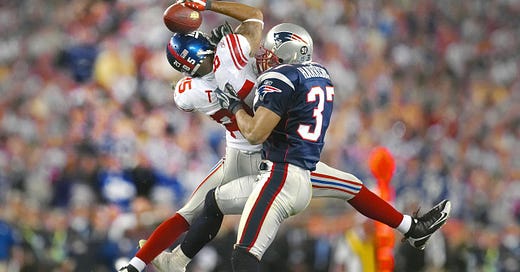


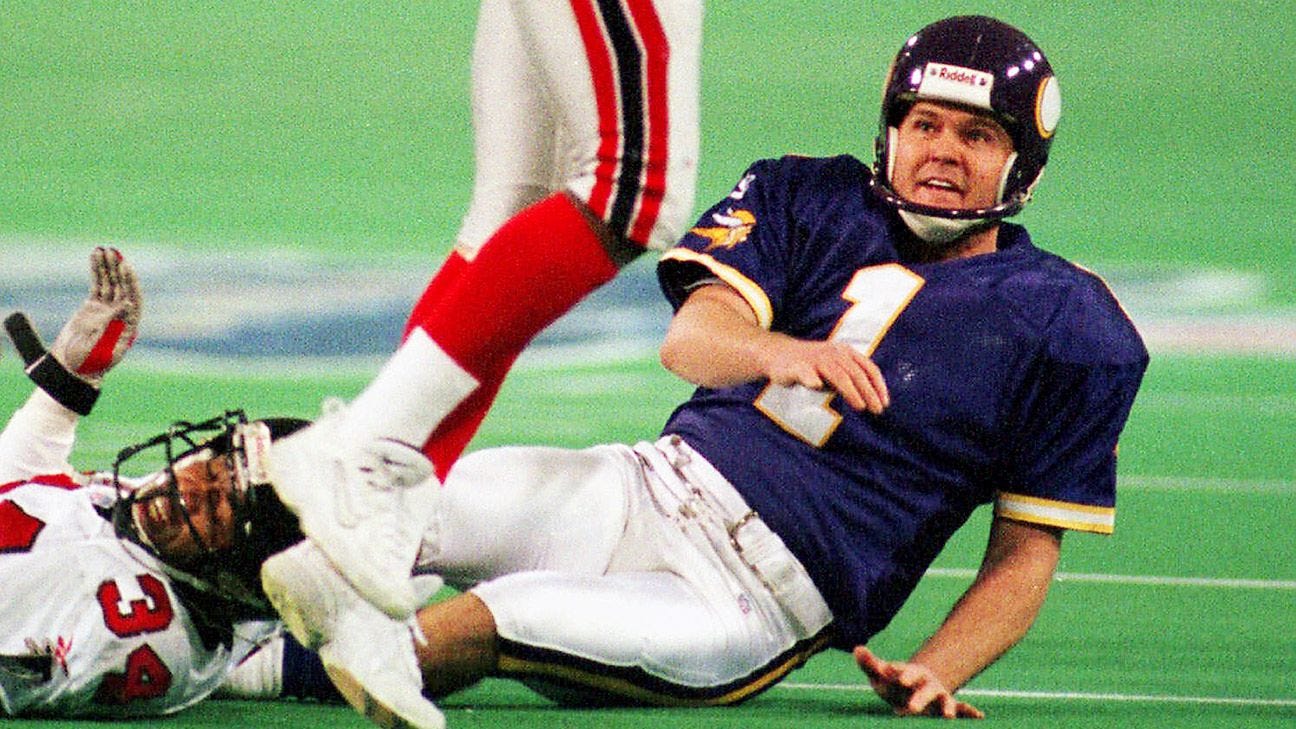
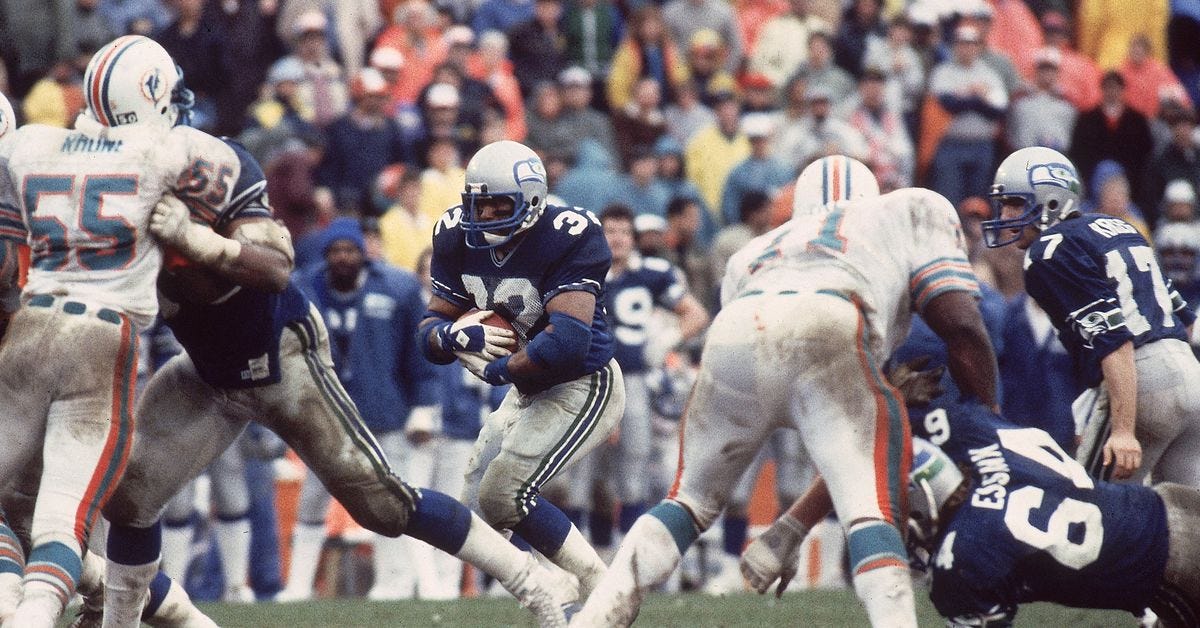
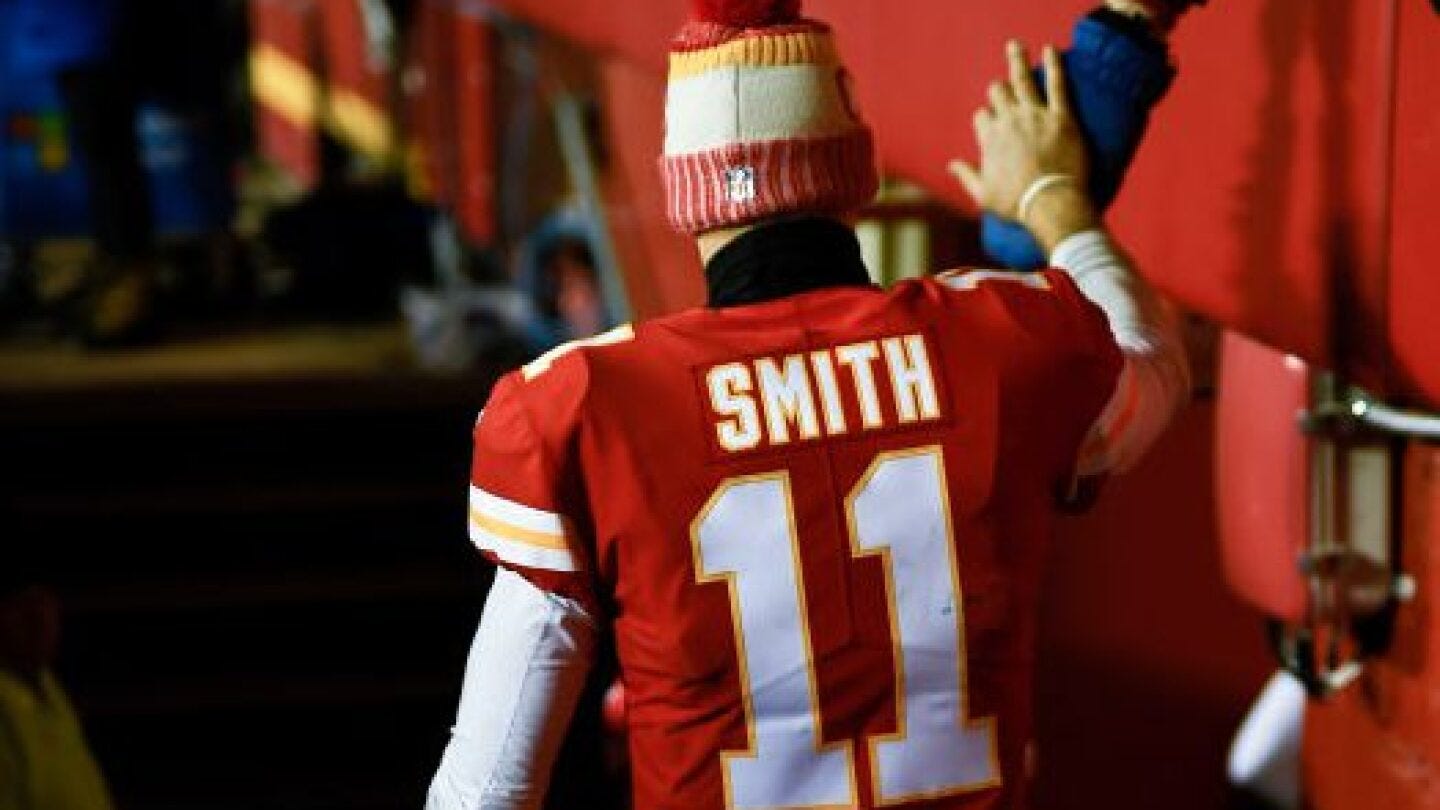
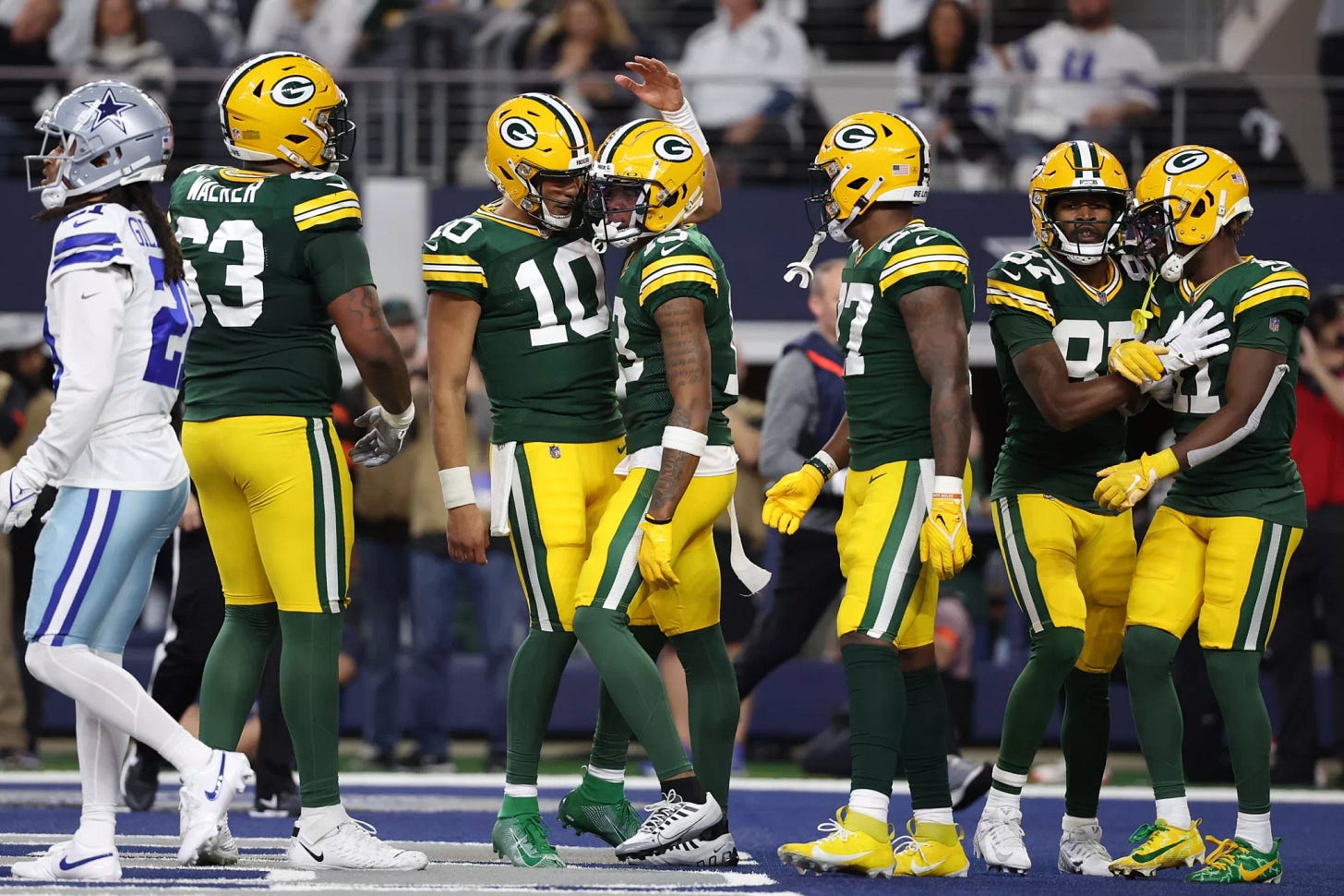
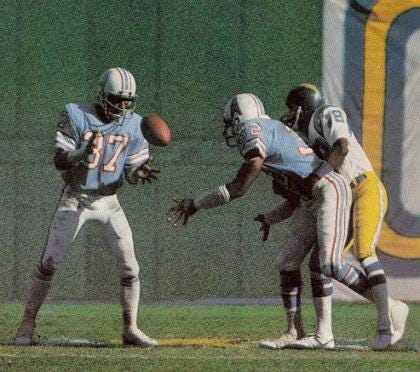
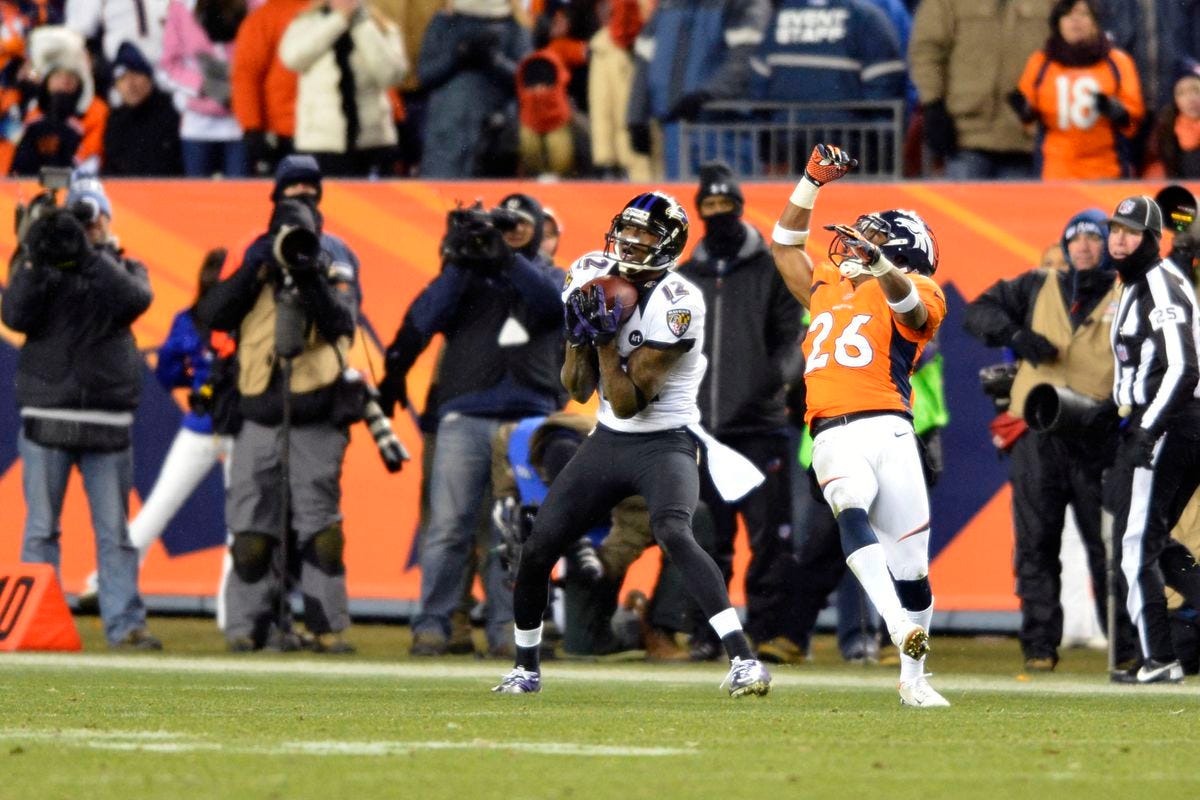
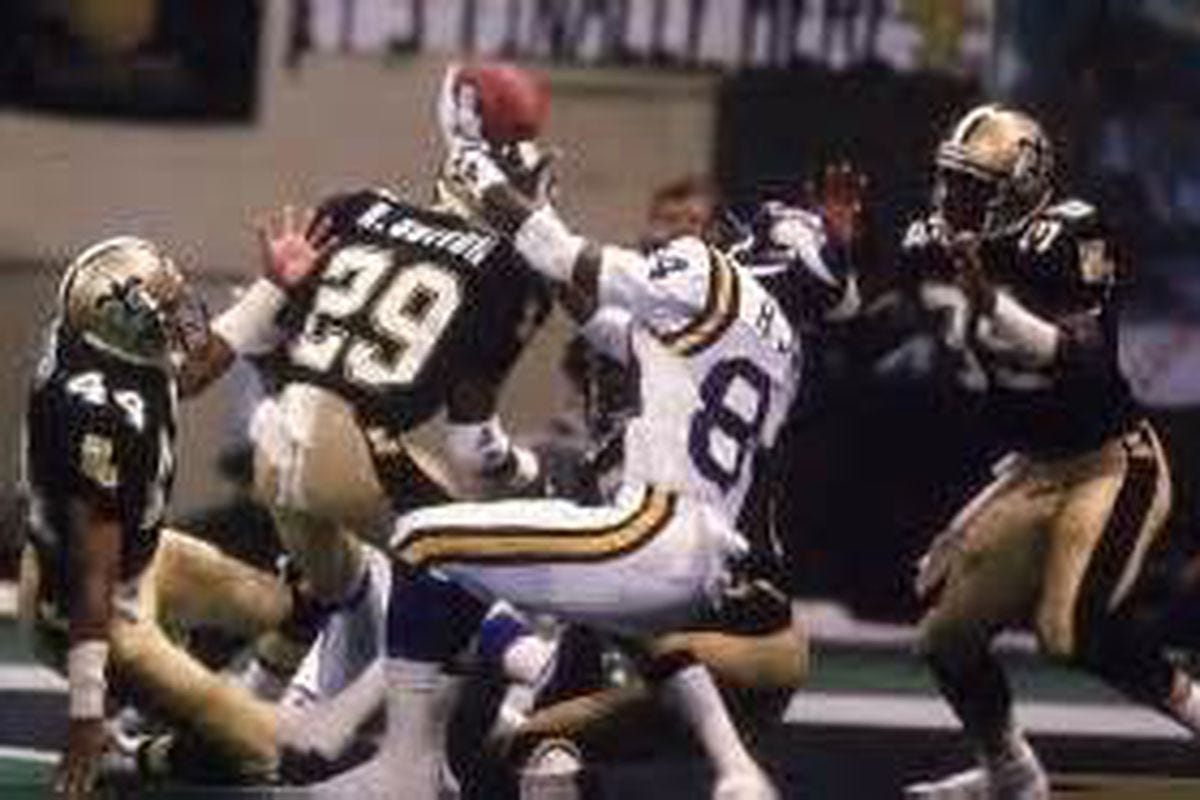
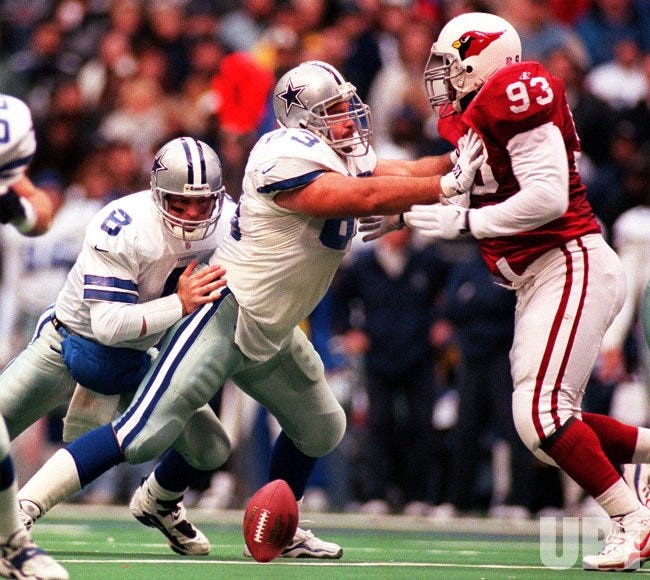
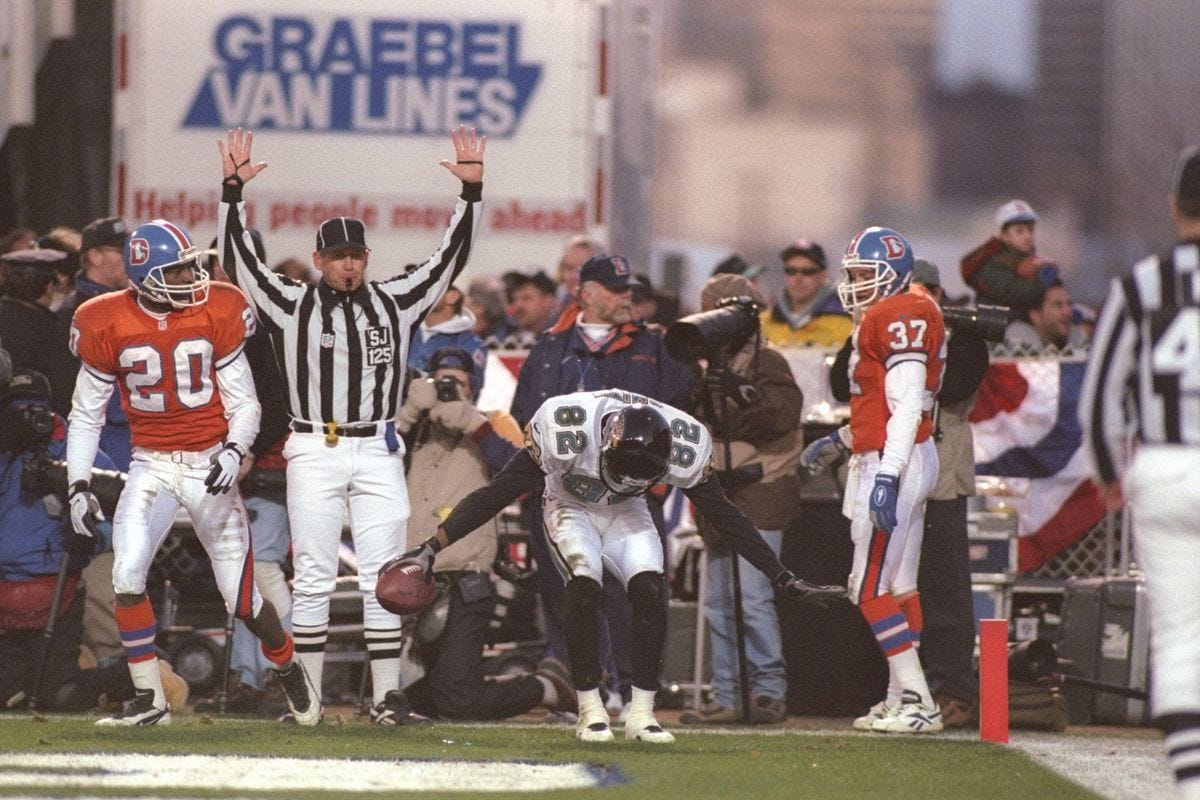
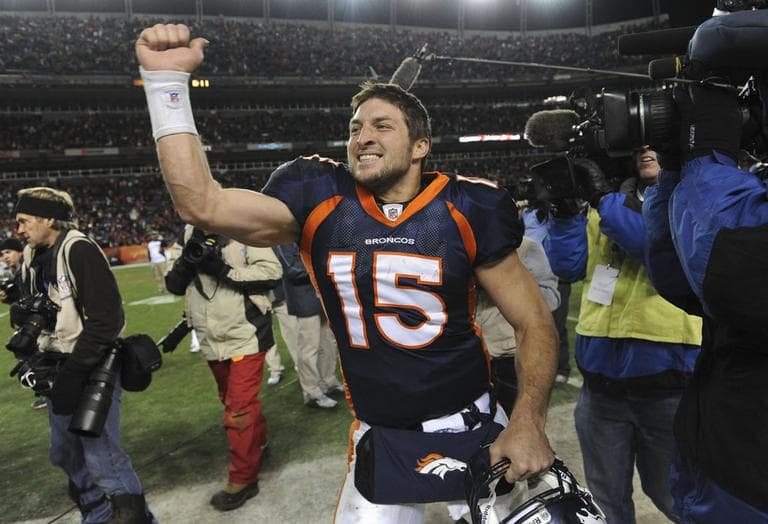
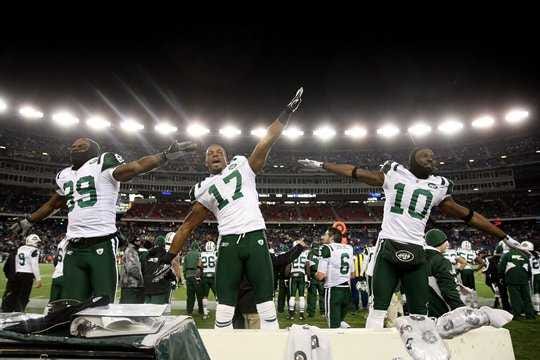
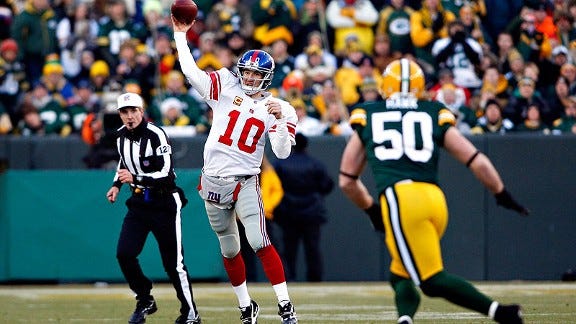
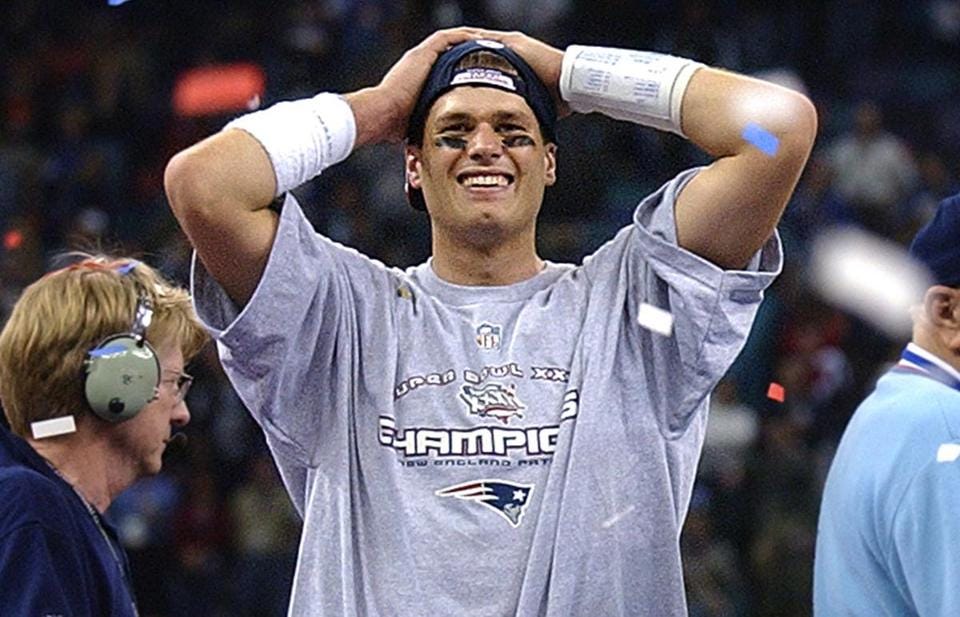
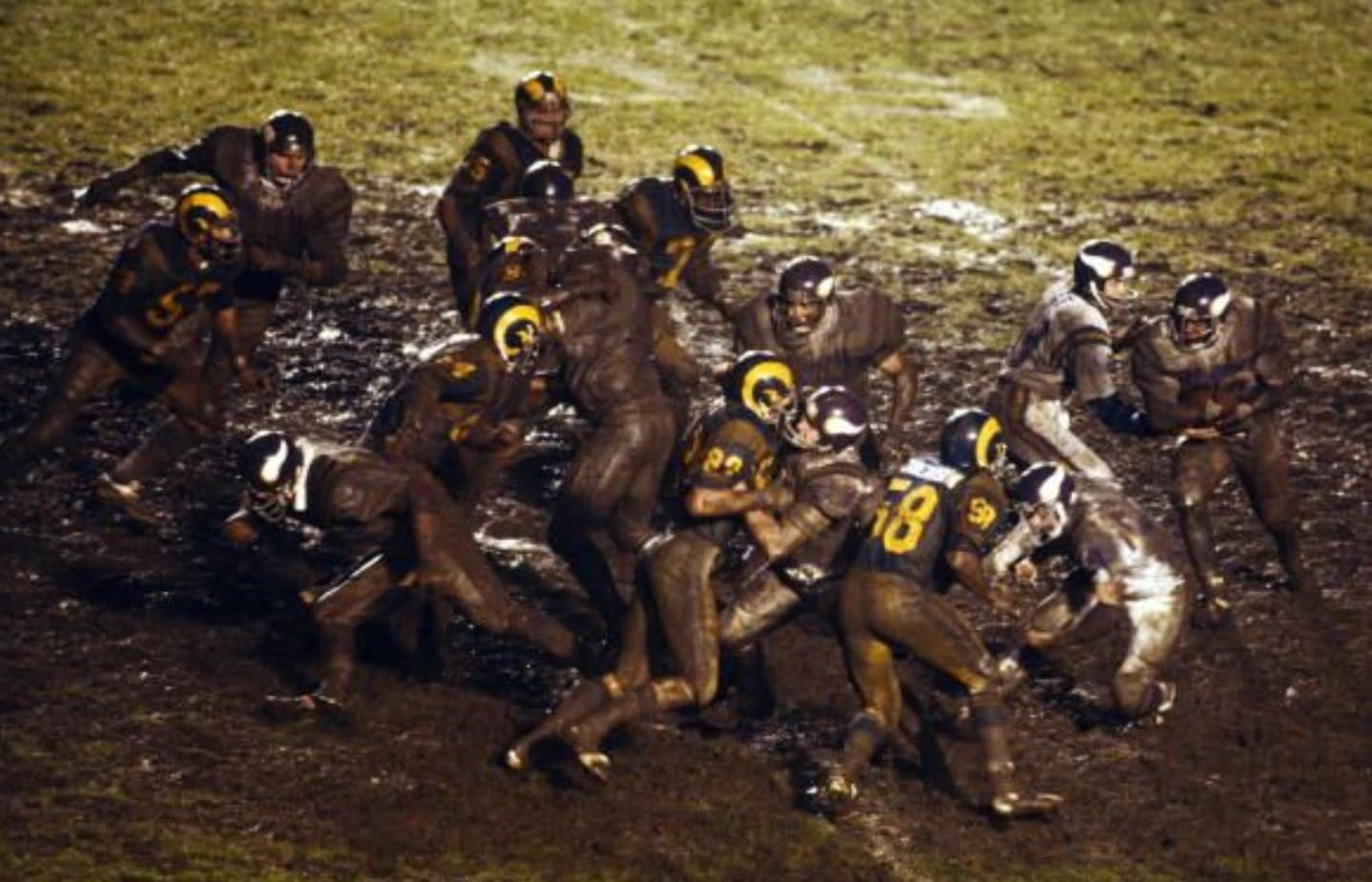
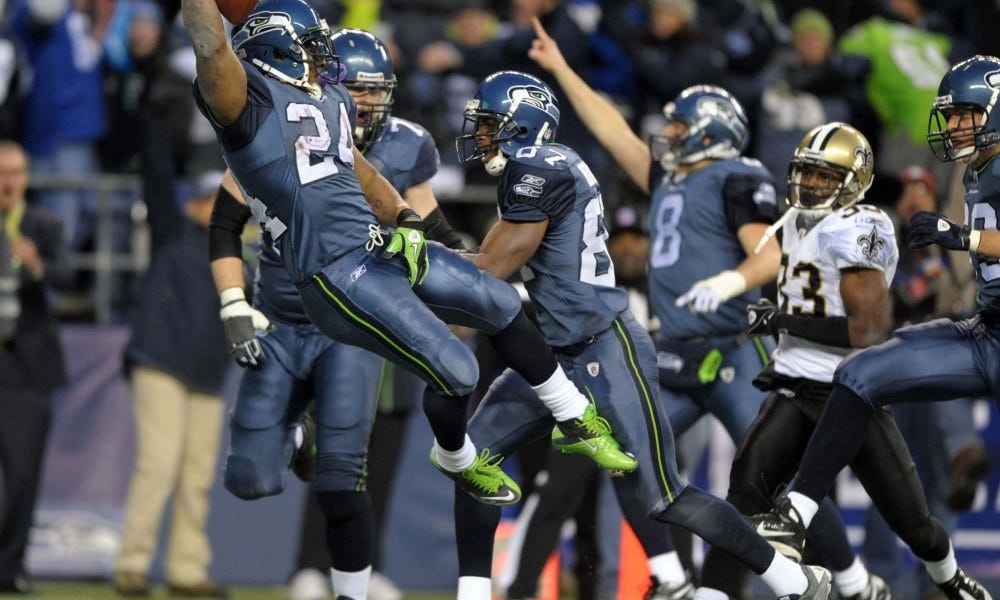
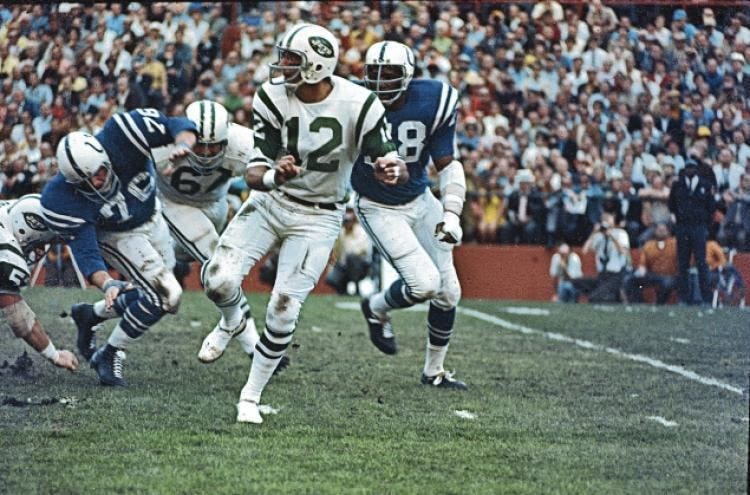
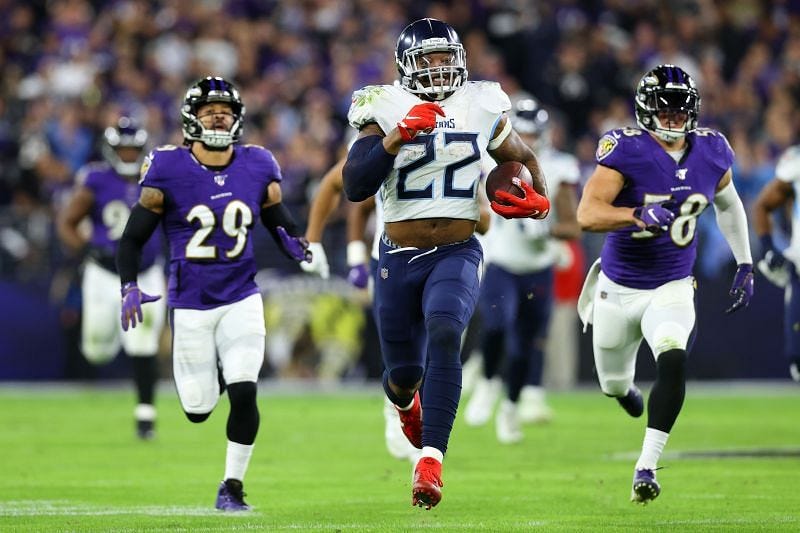
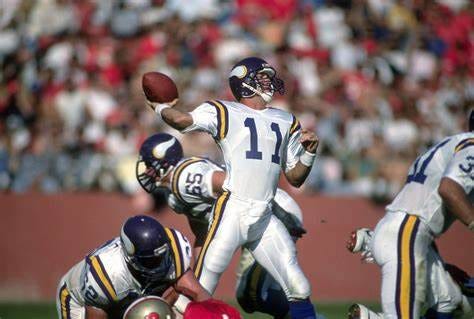

Loved this one Robbie! Great stuff!
Boy, would be a lot to go through here, and brings back a lot of memories, as I had a streak as a kid where I never missed a playoff game.
As a Giants fan, I don't delude myself that they had any business beating the Patriots after '07, or the Packers after '11. I think God has us still paying.
Do have some questions about your low rating of the '87 Vikings. I think the point spread in the game against the Saints partly reflects that they were quite well regarded at that time, which is my memory. I think there was a dropped pass by Darrin Nelson in the championship game against Washington, or they could have made the Super Bowl. Note they were 8-4 in the "non scab" games. Note also that, in 1986, they had outscored opponents by 125 points, then were 173 points in the black for the '88 regular season, and 76 points in the black for '89. The '87 regular season is the aberration, and take out the scab games, and they're still +36 over a 12-game season then, anyway.